In 2020, Inc42 launched the ‘30 Startups To Watch’ monthly series to showcase sector-agnostic early-stage companies with disruptive concepts
Between January and November 2021, we have featured more 300+ promising startups that continue to gain traction despite a challenging year for the Indian tech ecosystem
As we wrap up 2021, this edition brings you the top 30 startups from those 300+ businesses that have shown great tenacity, brilliant execution and remarkable growth
As we wrap up the ‘30 Startups To Watch’ series for 2021 and get ready to explore more vibrant and innovative businesses in 2022, we decided to give this year’s featured startups the centre stage to tell our readers what all they have achieved in 2021.
In the past 11 editions of 30 Startups, we have featured 320+ startups across sectors, and in the final edition of 2021, we bring you the top 30 startups from these 320+.
The top two sectors which recorded the maximum number of startups included ecommerce and enterprisetech. Over 90 ecommerce startups spread across different segments such as health & wellness, FMCG, lifestyle and 79 enterpristech startups in sub-sectors such as HRtech, marketing & sales tools, amongst others were featured this year.
Other sectors with a large number of startups included fintech (52 startups), edtech (26), healthtech (18 startups) and deeptech (16).
Although many were conceptualised after the big technology push post-pandemic, all the startups listed here have shown excellence in execution and remarkable growth.
While businesses head towards a brand new year, these 30 startups of 2021 have led from the front by displaying forward-thinking game plans, achieving scale, signing win-win partnerships, launching innovative products and raising growth funds.
Out of these 320 startups, 128 startups raised a combined funding of over $396 Mn in funding post they were featured in this list.
Over 5 startups secured more than $10 Mn each in funding, 10 startups raised between $5 Mn to $10 Mn and 23 startups secured more than 3 Mn in funding.
They have also taught us an age-old lesson. In every crisis, there will be an opportunity. We need to find it and innovate for it to unlock post-crisis growth.
Editor’s Note: The list below is not meant to be a ranking of any kind. We have listed the startups in alphabetical order.
AarogyaAI Innovations
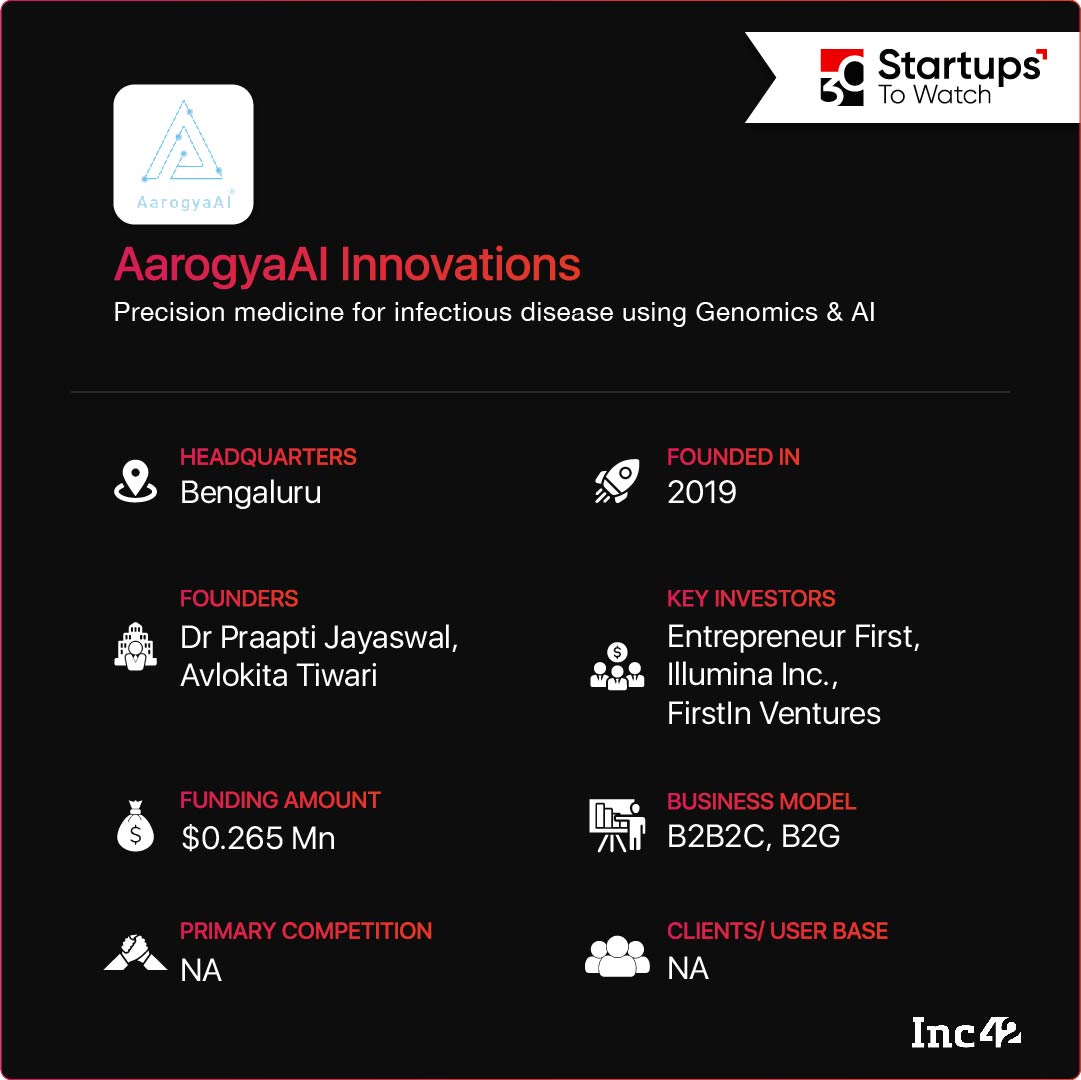
Why AarogyaAI Innovations Made It To The List
Set up in 2019, Bengaluru-based AarogyaAI aims to bolster India’s fight against TB. When the medtech startup was featured in April, it was developing a SaaS-based solution to help diagnose drug-resistant tuberculosis (DRTB) 100x faster than the existing gold standard.
AarogyaAI uses genomics and AI-powered precision diagnosis to track infectious diseases early and suggest the most effective drugs in each case. It has now told Inc42 that its SaaS solution for precision diagnosis shows promising sensitivity and specificity outcomes after validation with 1,000 samples.
The company will develop a robust, research-based product fit for mass deployment as India is working on eliminating TB by 2025. It will also help other high TB burden countries. Plus, it has partnered with IIT-Delhi and AIIMS-Delhi to set up an R&D programme to contain other infectious diseases.
Although in the pre-revenue stage, the startup has been awarded $80,000 in grants by NITI Aayog, BIRAC, NASSCOM and others. It was also part of GE Healthcare’s India Edison Accelerator Programme in April this year.
Almo
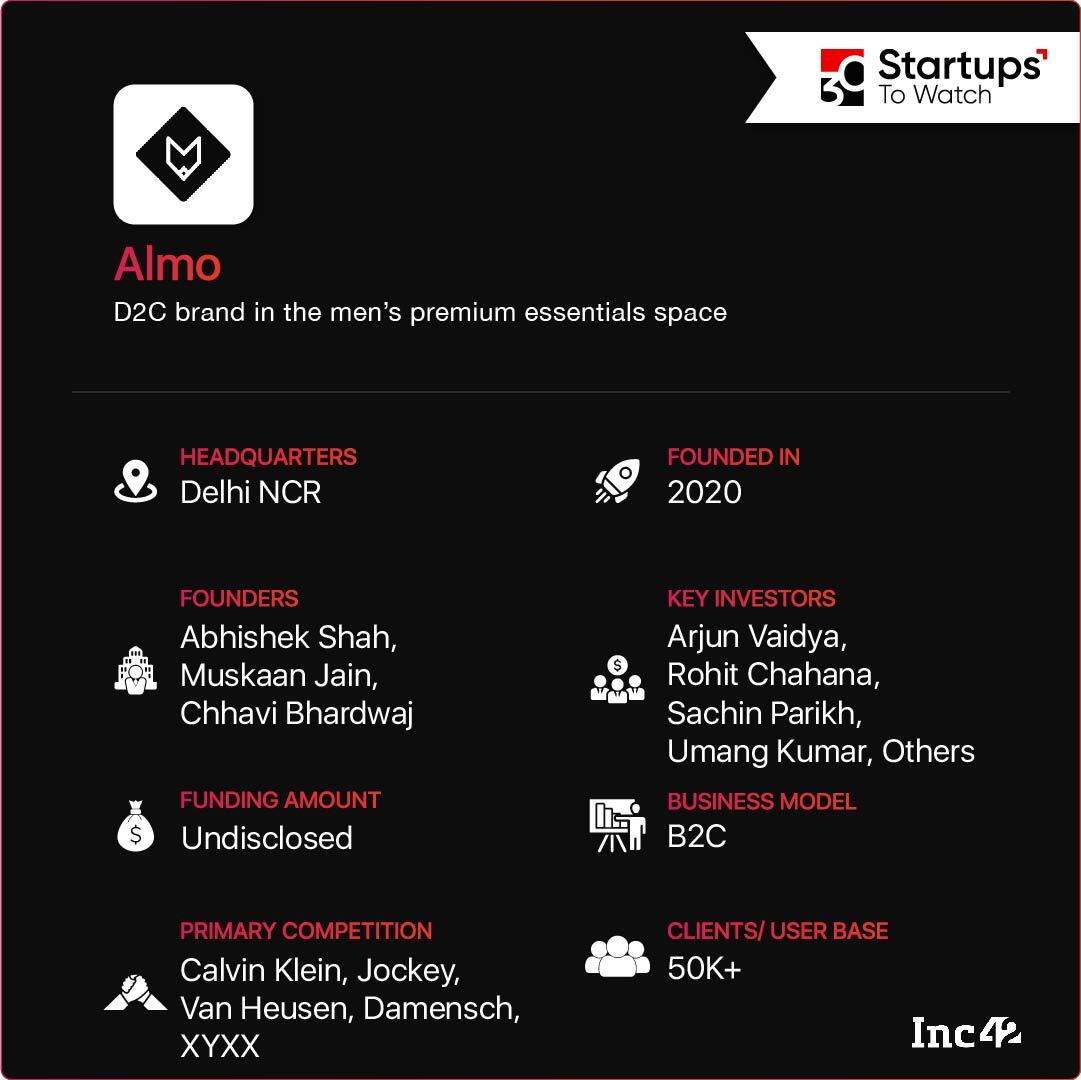
Why Almo Made It To The List
At Inc42, we constantly vouch for the D2C revolution and track all top categories operating in this space. Quite predictably, fashion has emerged as the top D2C category, thanks to influencer marketing, social commerce and the segment’s newfound focus on ‘green fashion’. But even before sustainability took centre stage, Gurugram-based Almo (previously, Almo Man) created men’s innerwear and loungewear from sustainable fabrics. The year was 2020.
It was featured in June, just before Inc42’s first edition of The D2C Summit, and has clocked 5x top-line growth since then. It has crossed the INR 1 Cr monthly GMV mark and claims 50K+ transacting customers, up from 30K+ in June. It has also launched its thermal wear range and started selling on new platforms such as Trell, Meesho and Ajio to scale up fast. As part of its sustainability drive, the startup claims to have moved its entire packaging from plastic to butter paper.
In 2022, the company aims to hit a monthly GMV of INR 5 Cr and launch an athleisure line. It will also finalise the next round of funding in January 2022.
AppsForBharat
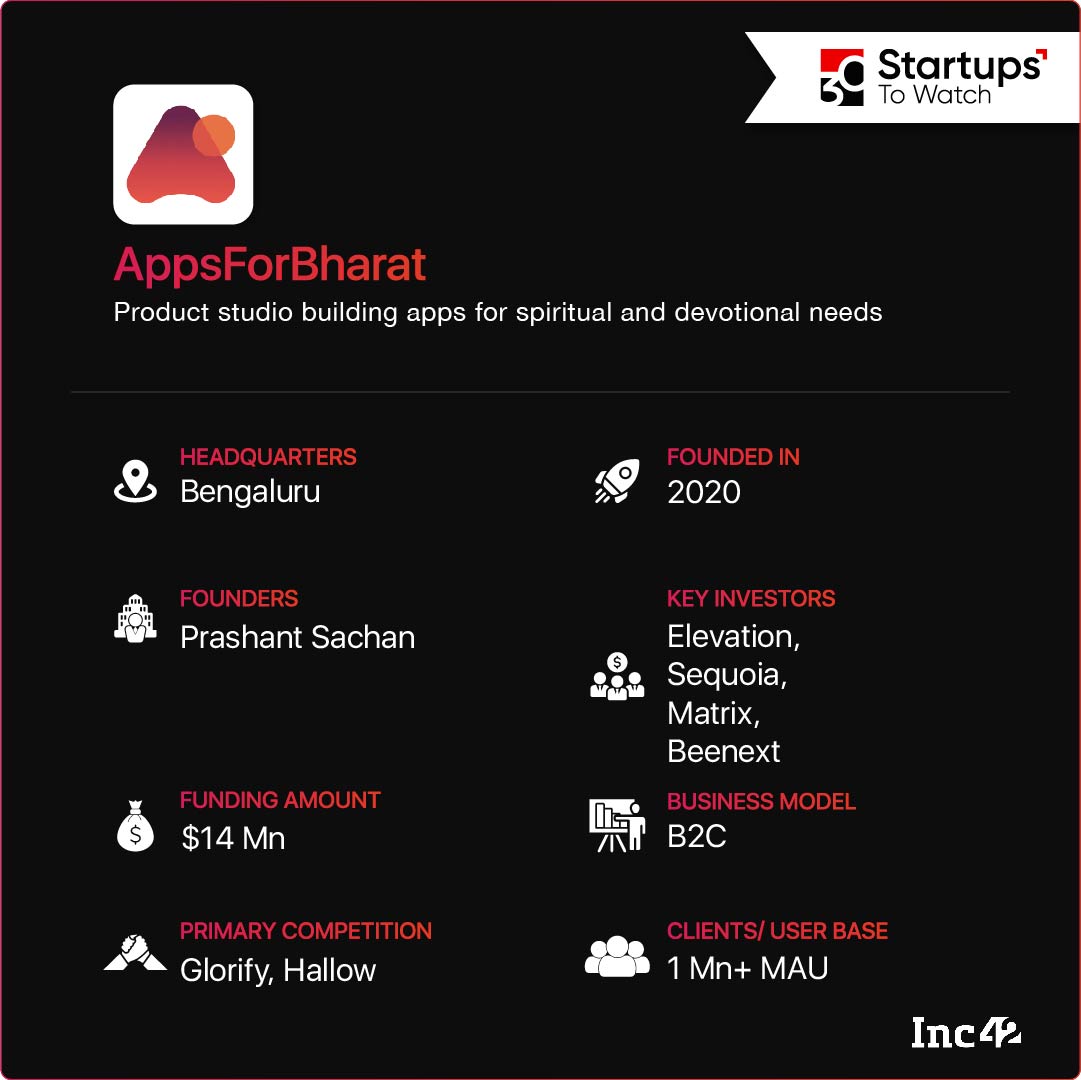
Why AppsForBharat Made It To The List
With the world spinning into tech mode after the onset of the pandemic in early 2020, people decided to seek its advantages to fulfil their spiritual and devotional needs. So, in November 2020, Bengaluru-based AppsForBharat was set up as a product studio for mobile and web apps that focus on these requirements.
In August, when we featured AppsForBharat, the startup’s first product Sri Mandir was still in stealth mode. Now the app has been officially launched and features a cornucopia of audio and video content, including discourses, scriptures and literature, almanacs, arti collections, horoscope and astrology tools, and a users’ community for interaction.
Its user base is growing by 20% per month, and it currently hosts 1 Mn+ monthly active users. It has also raised a Series A round of $10 Mn to expand its user base, create content and hire talent across product, data and engineering verticals.
In 2022, the startup plans to onboard 20 Mn monthly users, achieve high user retention and engagement on its product and evolve into a super-app for tech-enabled devotional practices and spiritual awareness.
Ausum
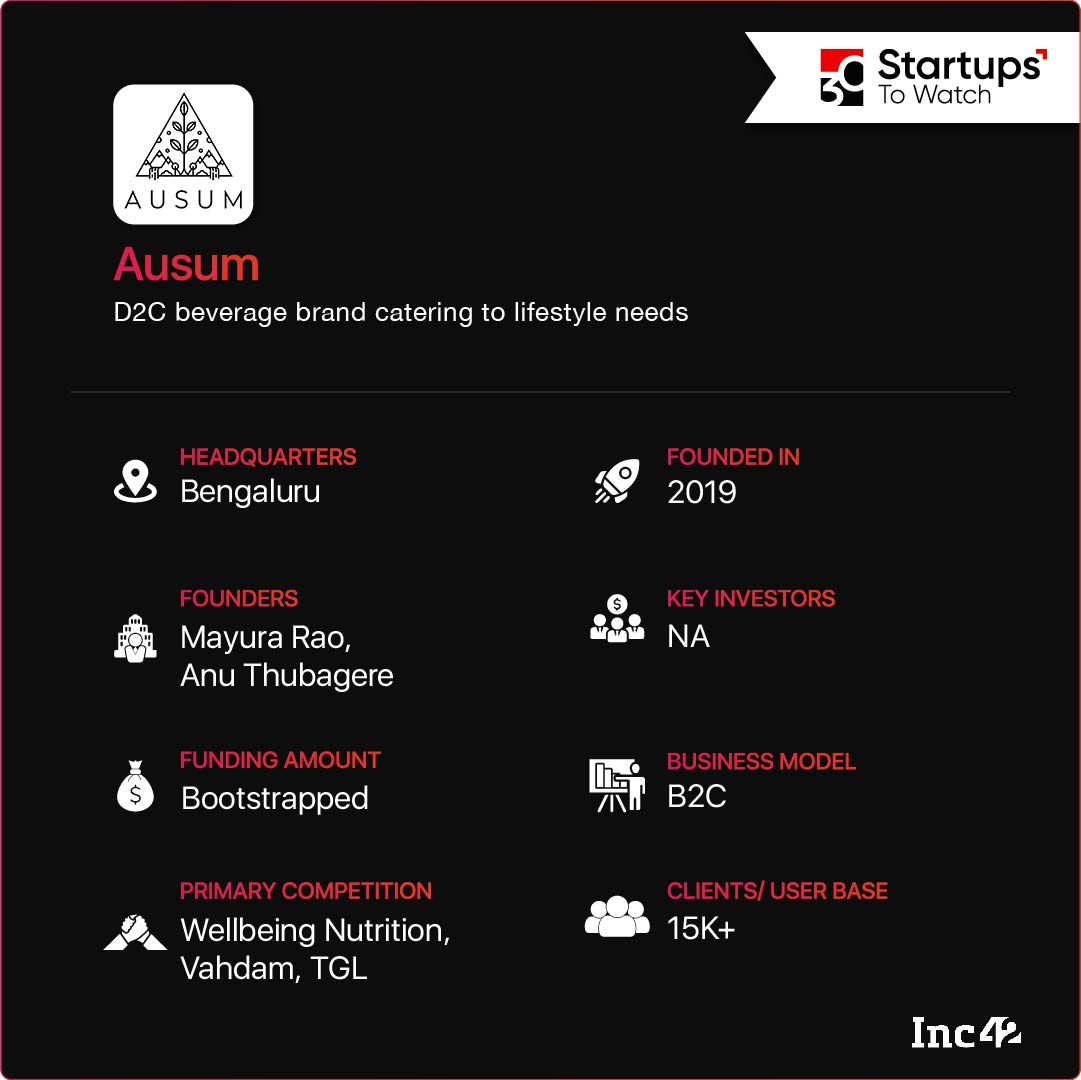
Why Ausum Made It To The List
Bengaluru-based lifestyle beverage brand Ausum was set up in 2019 with a health-first approach. And it aims to marry science with lifestyle, creating a layer of self-care “as effortless as sipping one’s favourite cuppa”.
The startup was featured in the November edition, and in about a month, it claims to have a 5% revenue contribution from its recently launched stress-relief snack bars. It has further seen MoM growth of 25% and served more than 15K consumers in 2021, of whom 30% are returning customers. The bootstrapped firm has also launched six New Year-focussed assorted gift packs on its website.
By FY22, the company plans to grow its revenue 3x year on year, aims to develop a wellness and F&B education ecosystem and help people make healthy lifestyle changes.
Bare Anatomy
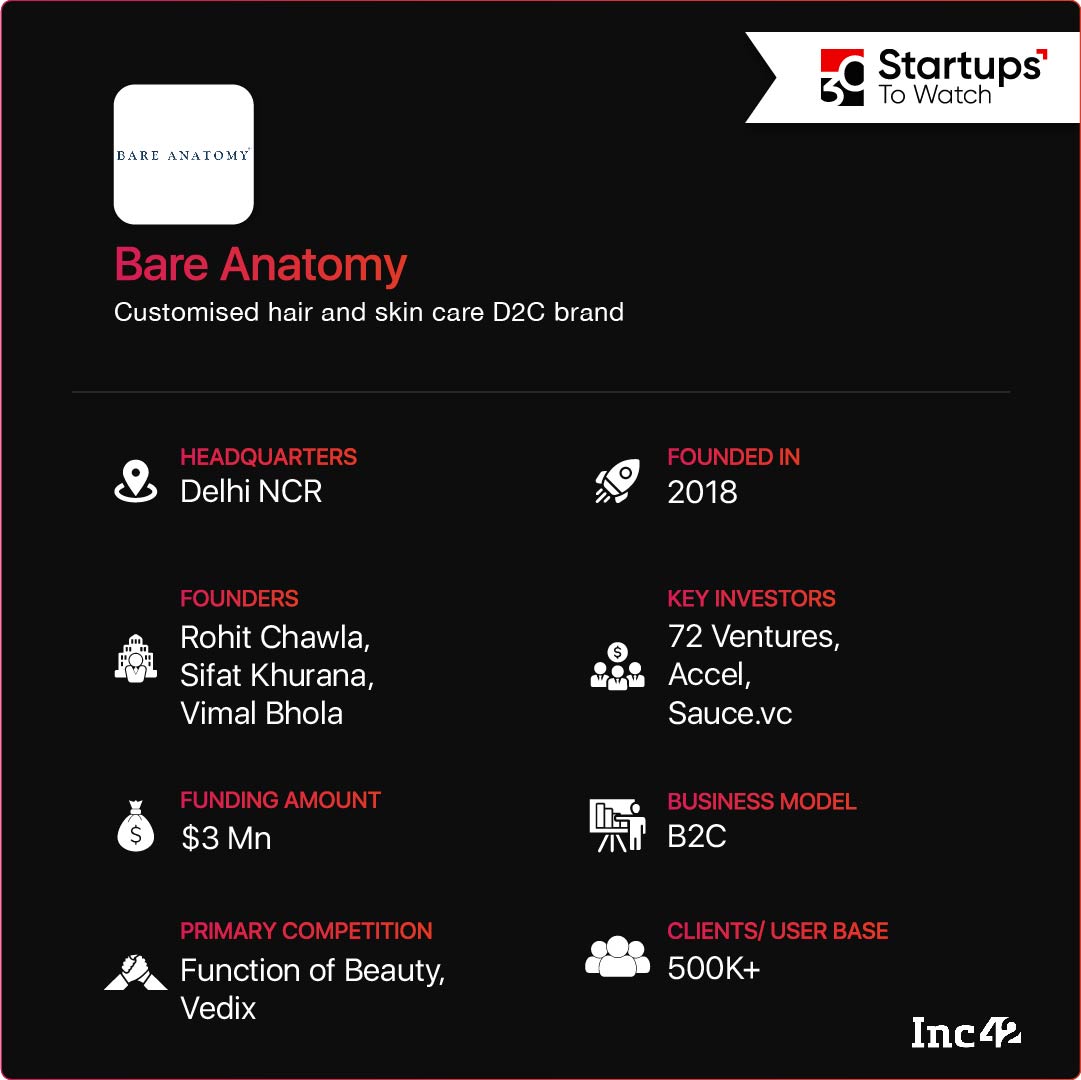
Why Bare Anatomy Made It To The List
Gurugram-based Bare Anatomy was started in 2019 to craft customised haircare routines for people in the 16-45 age group. After a thorough analysis of all hair types, it has identified specific requirements and developed several haircare kits sold exclusively on its website. Lately, the company has come out with a three-step personalised skincare regime.
When the startup was featured in the D2C edition in June, it had six SKUs across two categories — haircare and skincare. Since then, it has added a new brand called Chemist At Play to its portfolio and increased its SKUs to nine. The company claims that its skincare revenue and customer base have grown as big as its flagship category, haircare.
In September 2021, Bare raised $2.5 Mn in Series A to fund its product launch, marketing and team expansion. In addition, it has doubled down on manufacturing and R&D and aims to bring hair and skin experts to launch a video series to market its products.
Beco
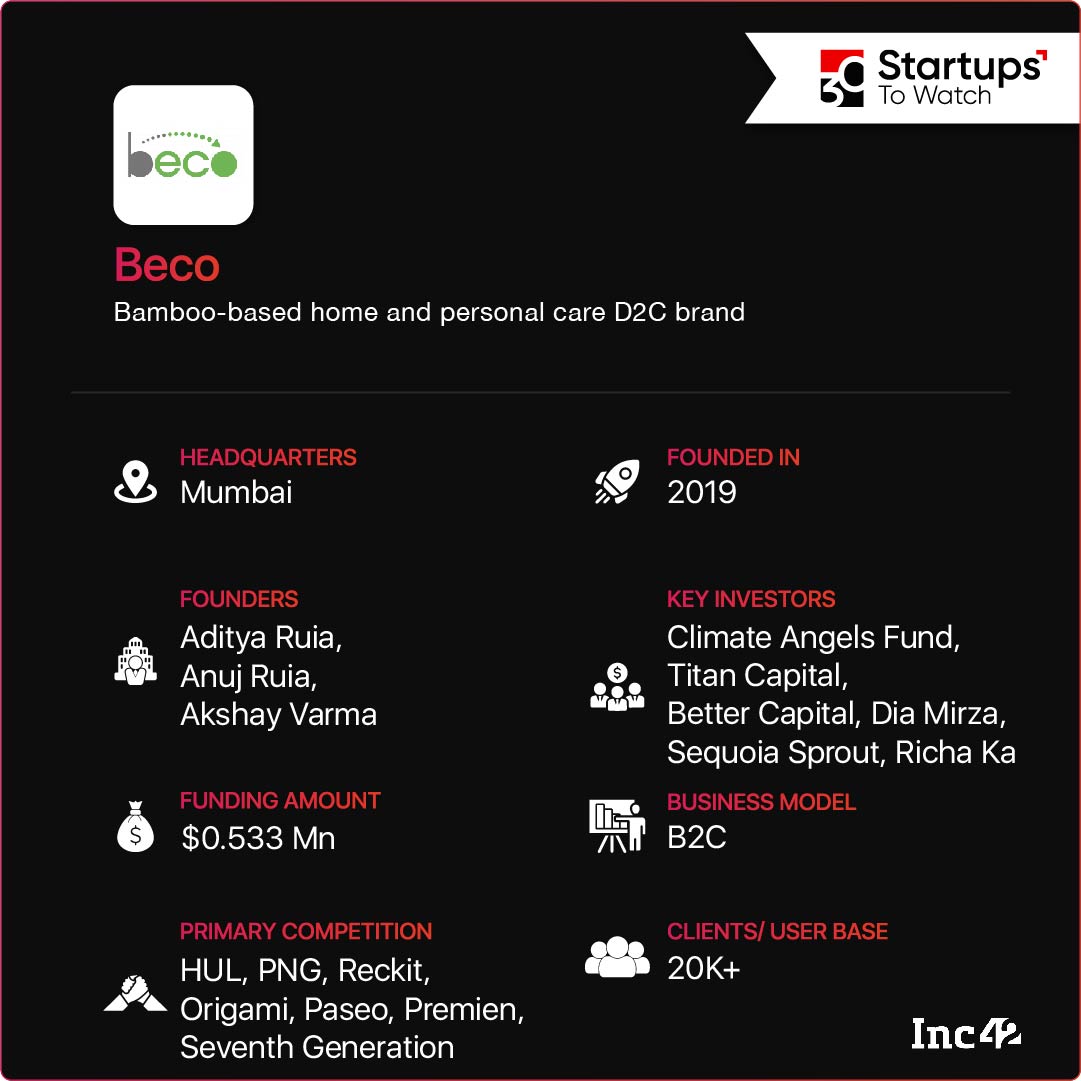
Why Beco Made It To The List
Home and personal care startup Beco was launched in 2019 after its founders realised how difficult it is to get rid of plastic waste. The Mumbai-based D2C brand has launched a wide range of bamboo-made eco-friendly essentials such as reusable kitchen towels, tissues, trash bags and charcoal-infused toothbrushes and toothpicks to cut down on single-use plastic. Plus, it uses only recycled paper for packaging.
The startup was featured in November when we listed D2C brands and D2C enablers. Since then, it has created a brand movie starring Bollywood actress Dia Mirza to amplify the essential shift from plastic to green substitutes. After the campaign, the company has seen a 2x jump in the number of customers and 5x year-on-year growth in sales compared to last year. Beco has forayed into the American market via Amazon US and plans to adopt an omnichannel strategy in India by selling at supermarkets and hyperlocal marketplaces.
It expects to raise a Series A round in January-February to introduce new products, expand in global markets and ramp up its hiring across functions.
BigSpoon
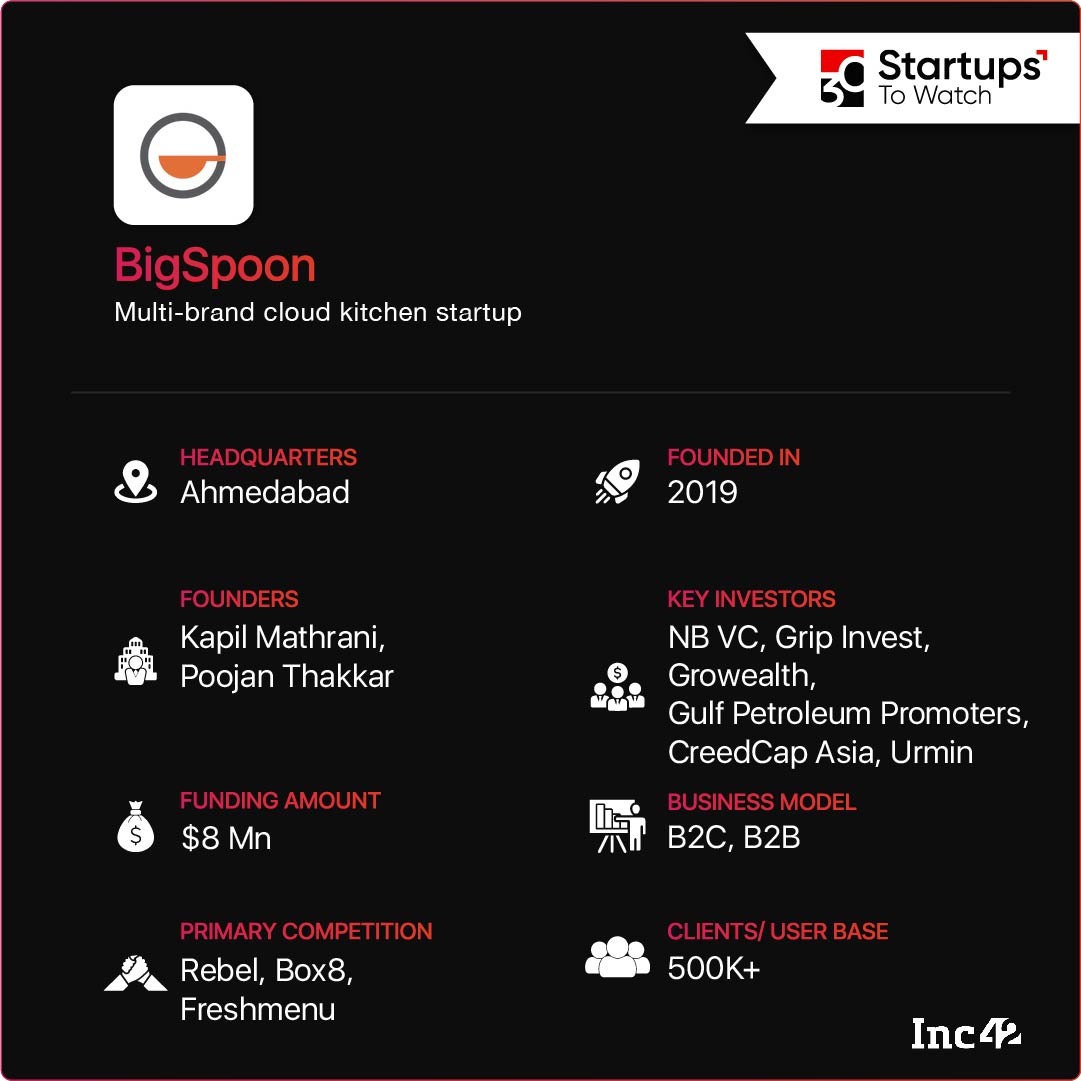
Why BigSpoon Made It To The List
Set up in 2019, Ahmedabad-based BigSpoon is a multi-brand cloud kitchen catering to Tier 2 locations. When the company was featured in February, it operated four brands — Makhni Brothers, Oven & Grill, Meals101 and Thali Central — and delivered the food through its own app, Zomato and Swiggy.
Ten months later, it has added three brands to its portfolio — The Wrap Co, East Pizza Co and Monkey Fries. Plus, there are three new verticals. These include Brand Konnect that provides a co-branding and marketing suite to food companies, a Kitchen-as-a-Service platform for resource sharing (workforce, food materials and machines) and a Brand-as-a-Service vertical for franchising and licensing BigSpoon’s brands.
In November 2021, the startup clocked 100K+ transactions for the first time, up from 81K+ in October. BigSpoon operated 22 cloud kitchens across 19 cities in FY21 and raised $6 Mn in pre-series A funding to launch new brands, expand in new cities and hire more people.
In a recent conversation with Inc42, the company said that It would develop a food court app for browsing and ordering BigSpoon products at one go, introduce three offline experience centres and launch three more brands in 2022. It also aims to increase the number of cloud kitchens to 150+ in 60 cities, including a few locations in Singapore and the Middle East.
Binks
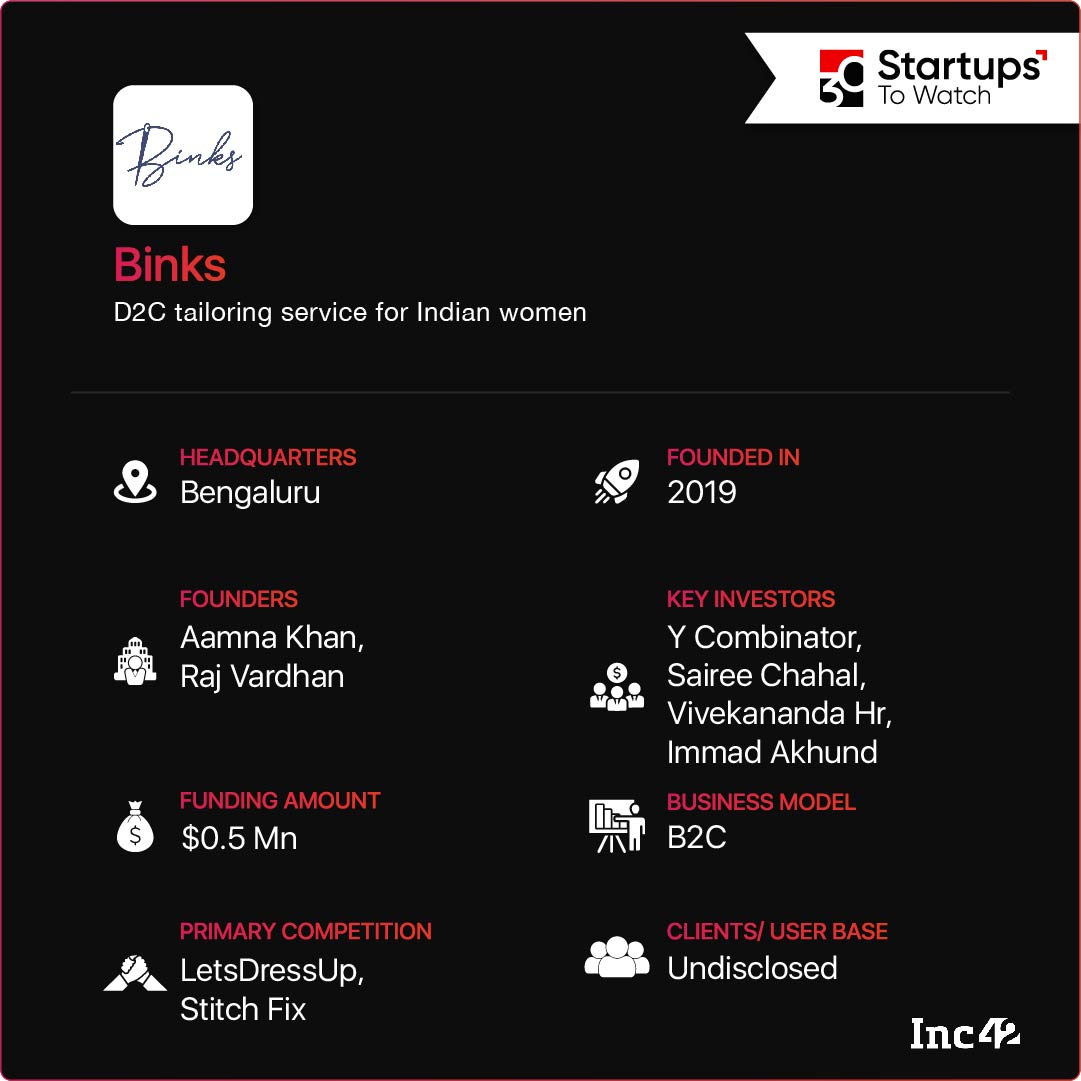
Why Binks Made It To The List
Tailoring services, part of India’s tertiary/service sector, are hugely unorganised and urgently need an upgrade. So, Bengaluru-based Binks was set up in 2019 to refurbish custom-stitched fashion space with the help of digital-age technology.
Customers can skip physical visits to any of its boutiques as they can share their choice designs via WhatsApp and specify measurements and fabrics via video calls. Alternatively, a Binks consultant can visit them to help with measurements and materials. Stitched outfits are home-delivered to ensure both convenience and safety in the wake of the Covid crisis. When Binks was featured in October, it was only operating in Bengaluru. But it is now keen to grow into a large business.
The startup plans to enter six more cities and set up three more tailoring hubs. It is set to go live with the first pan-India B2B2C tie-up for bulk orders and pilot an international tailoring service for the Indian diaspora.
Charzer
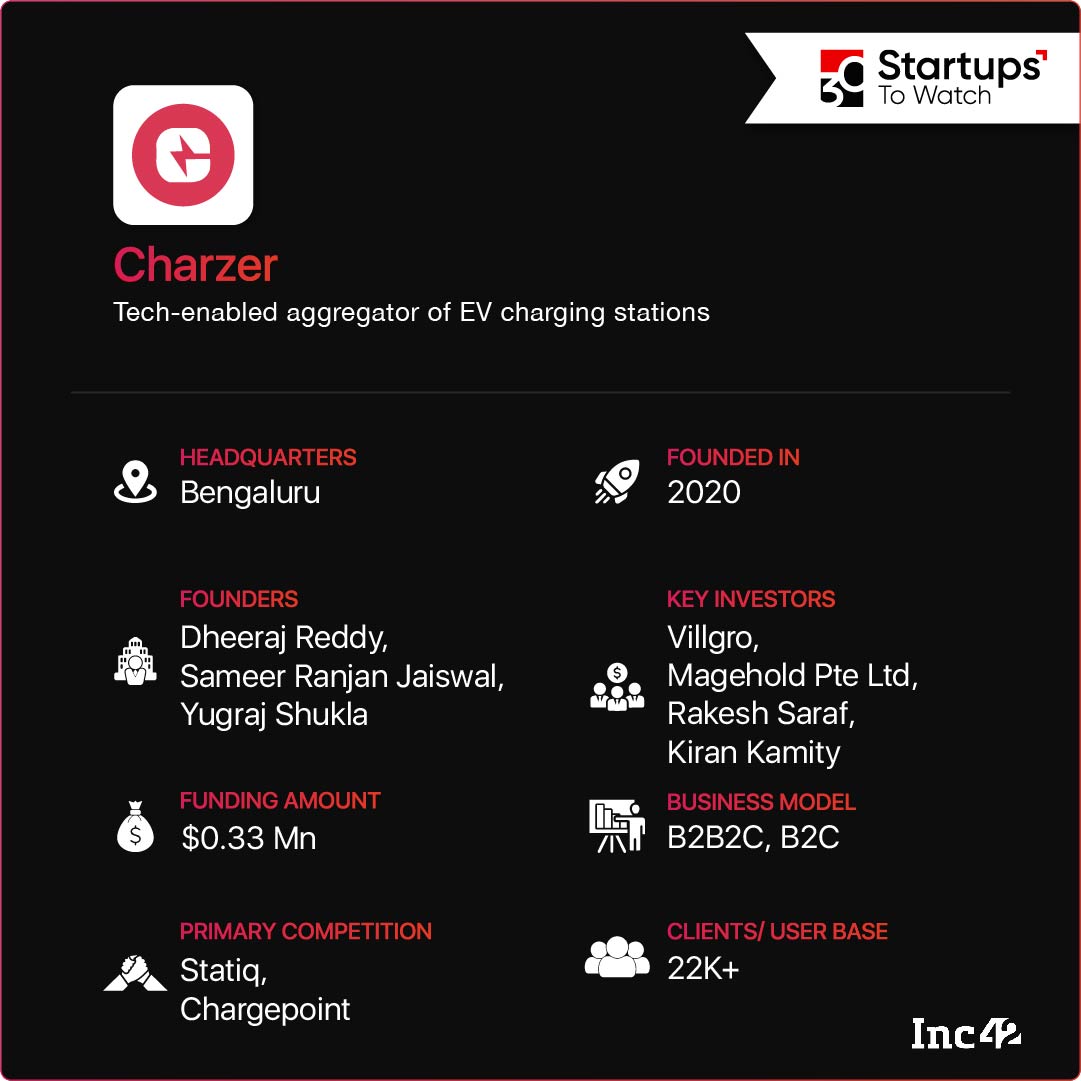
Why Charzer Made It To The List
Bengaluru-based Charzer entered the EV charging space in 2020 to ensure that the lack of charging stations would not halt the growth of the fledgling industry in India. The startup provides an asset-light, affordable setup and creates a network for easy access to public charging stations. In the process, it has converted neighbourhood cafeterias, restaurants, malls and mom-and-pop stores into EV charging stations by installing a compact, zero-maintenance and IoT-enabled charging system.
When we featured Charzer in July, it had already developed its flagship product called Kirana Charzer, along with an app that helps users find public EV charging stations, book charging appointments and pay for the same. In October, the company released an upgraded version of Kirana Charzer that is more affordable, compact and efficient. The startup has already installed 800 new units compared to 650+ during the first year of operations.
Charzer has also announced its tie-ups with Hero Electric and Omega Seiki Mobility to set up 100K and 20K charging stations, respectively.
In 2022, it plans to scale up to 13K+ charging stations across the top 10 cities in India to serve more than 8 Lakh customers. It will soon raise a series A round of funding to implement its expansion plans.
Countingwell
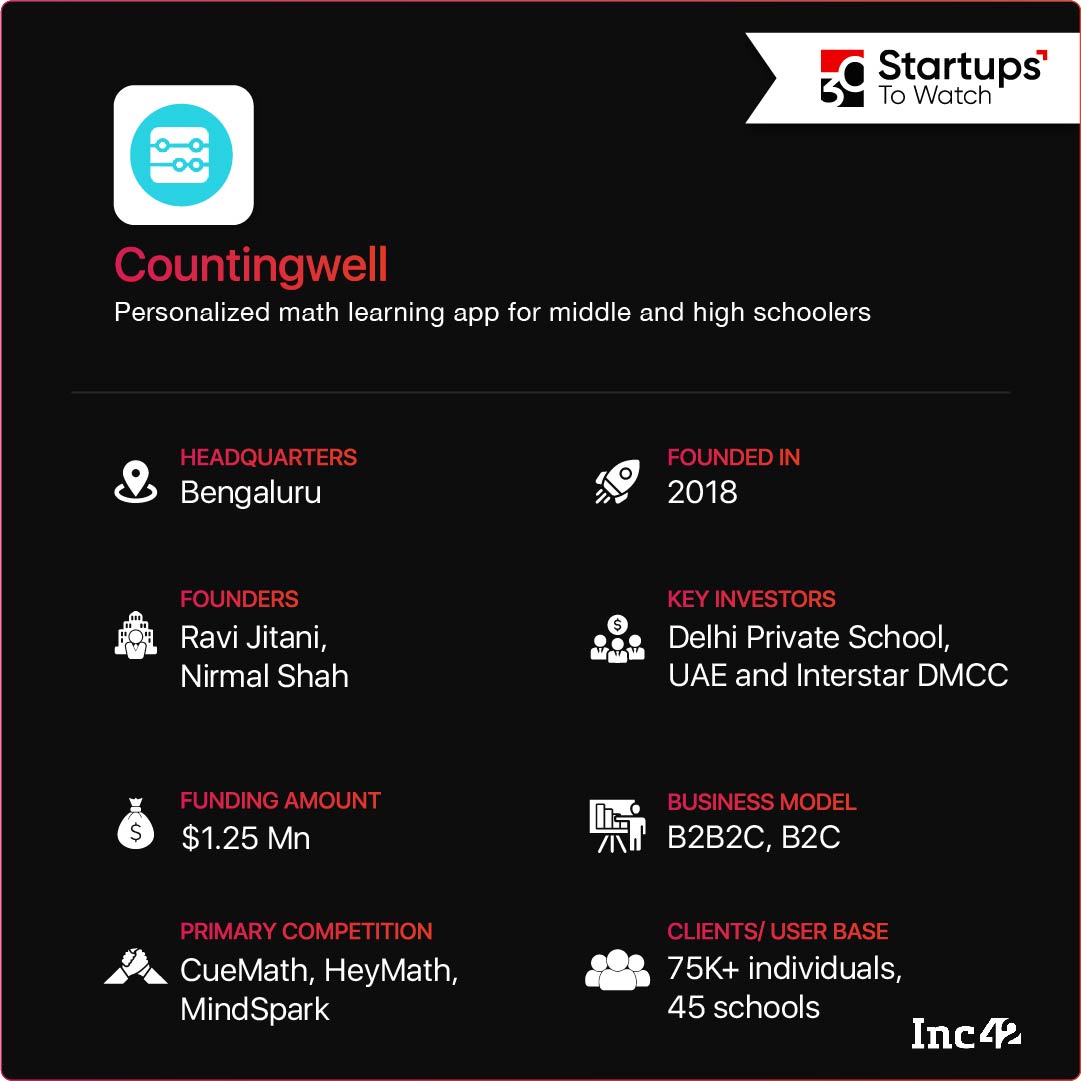
Why Countingwell Made It To The List
Much before India’s edtech companies saw a massive uptick in demand due to the onset of the pandemic, Countingwell had started its operations to offer a gamified math learning experience to K-10 students. When it was featured in February, the Bengaluru company was already running a personalised mathematics course for standards 6-10, and it was free for all.
Later in the year, the company adopted a freemium model and ventured into career-builders and competition-oriented courses. It launched a foundational ‘math for data science’ programme for students of class 6, class 7 and class 8. It is a learn-through-competition module where students can complete a course aligned with school-level math by participating in monthly contests. The edtech firm has also introduced the Ramanujan Maths Scholarship worth INR 5-10K and plans to make it an annual affair.
Additionally, it launched an exam prep kit featuring 2K+ practice questions, chapter summaries and quick learning guides, along with access to free doubt-solving on its app. Premium and premium pro models are also in place for ad-free learning modules and live doubt-solving sessions.
Countingwell embarked on a B2B2C journey by onboarding 45 schools for a free AI-powered homework and assessment product. The founders also raised $250K from angel investors, friends and family. It entered the Middle East market and is currently operating in the UAE, Bahrain and Qatar.
In 2022, the startup aims to launch courses on financial literacy and logical reasoning, develop learning programmes for standards 1-5 and raise a pre-series A round of $1-2 Mn.
Decentro
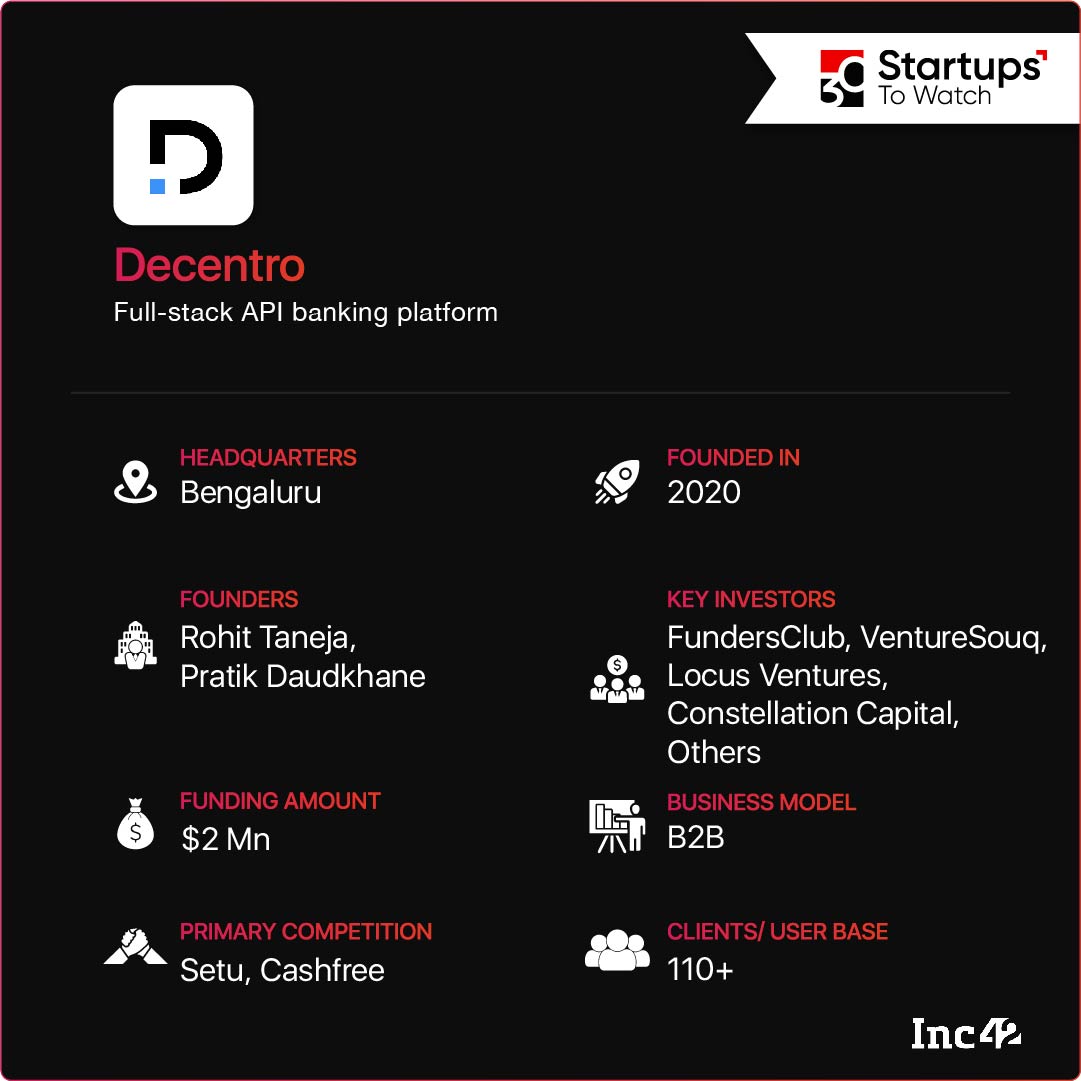
Why Decentro Made It To The List
Launched in 2020 and featured in the January 2021 edition, Decentro is a full-stack API banking platform where companies can select their desired financial modules, integrate the same in a sandbox (essentially, a testing environment) and launch their fintech products in a couple of weeks. From KYC and KYB to virtual cards and account linking, the Bengaluru-based fintech firm offers plug-and-play financial modules to ensure quick and hassle-free implementation for its B2B clients.
The company has grown at a fast clip throughout the year and launched three products. First, a connected banking module that allows businesses to link with their customers’ accounts via API for fetching aggregated account statements. Then a card issuance model that enables neobanks, marketplaces, NBFCs, fintechs and brands to launch their co-branded or white-label prepaid cards/credit cards. And finally, an API service to integrate and embed lending as a feature inside their existing product or platform.
It currently has around 110 customers, up from 15 in January. It has also raised $300K at a higher but undisclosed valuation after the previous seed round in 2020.
Decentro plans to 3x the number of customers and eyes 10x revenue growth in 2022.
Earth Rhythm
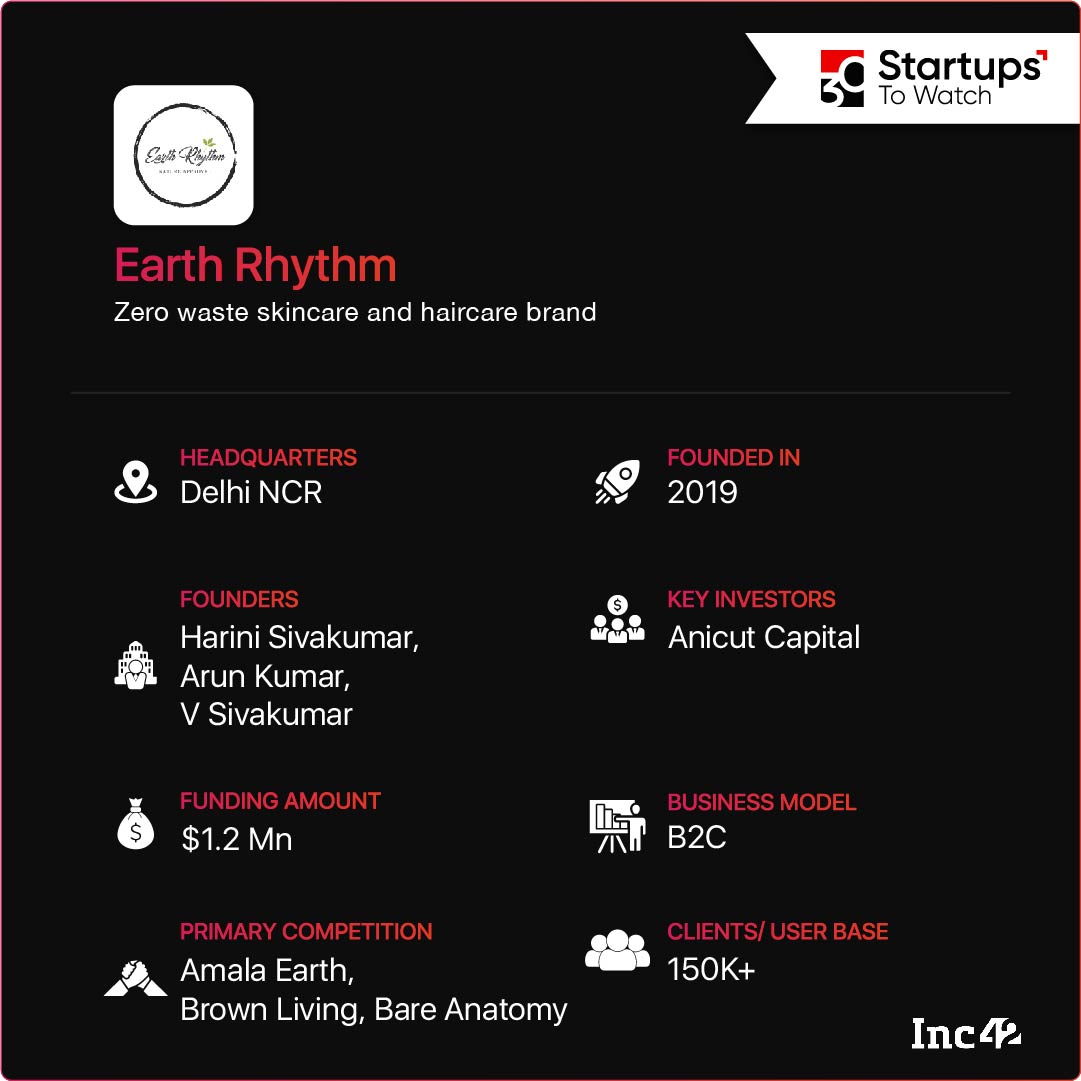
Why Earth Rhythm Made It To The List
Launched in 2019, Gurugram-based Earth Rhythm aimed to develop a zero-waste skincare brand that would not add to the pollution load or plastic curse. When the company was first listed here in June, it had only one product in its kitty, a shampoo bar.
But in the past six months, the startup has grown its flagship products and added a vegan kohl pencil; face gels with aloe vera, sea glow and cica; cold-pressed facial oils made from passionfruit, buriti, pracaxi and Brazilian nut, and a new range of face mists and buttercream soap. It also got a new logo and improved its product packaging. Post its recent launches and makeover, the company has started to clock more than 1K orders per month.
Earth Rhythm aims to reach an ARR of INR 100 Cr in 2022, with some exciting launches in the pipeline. It will also explore a few international markets and close an institutional funding round.
Eloelo
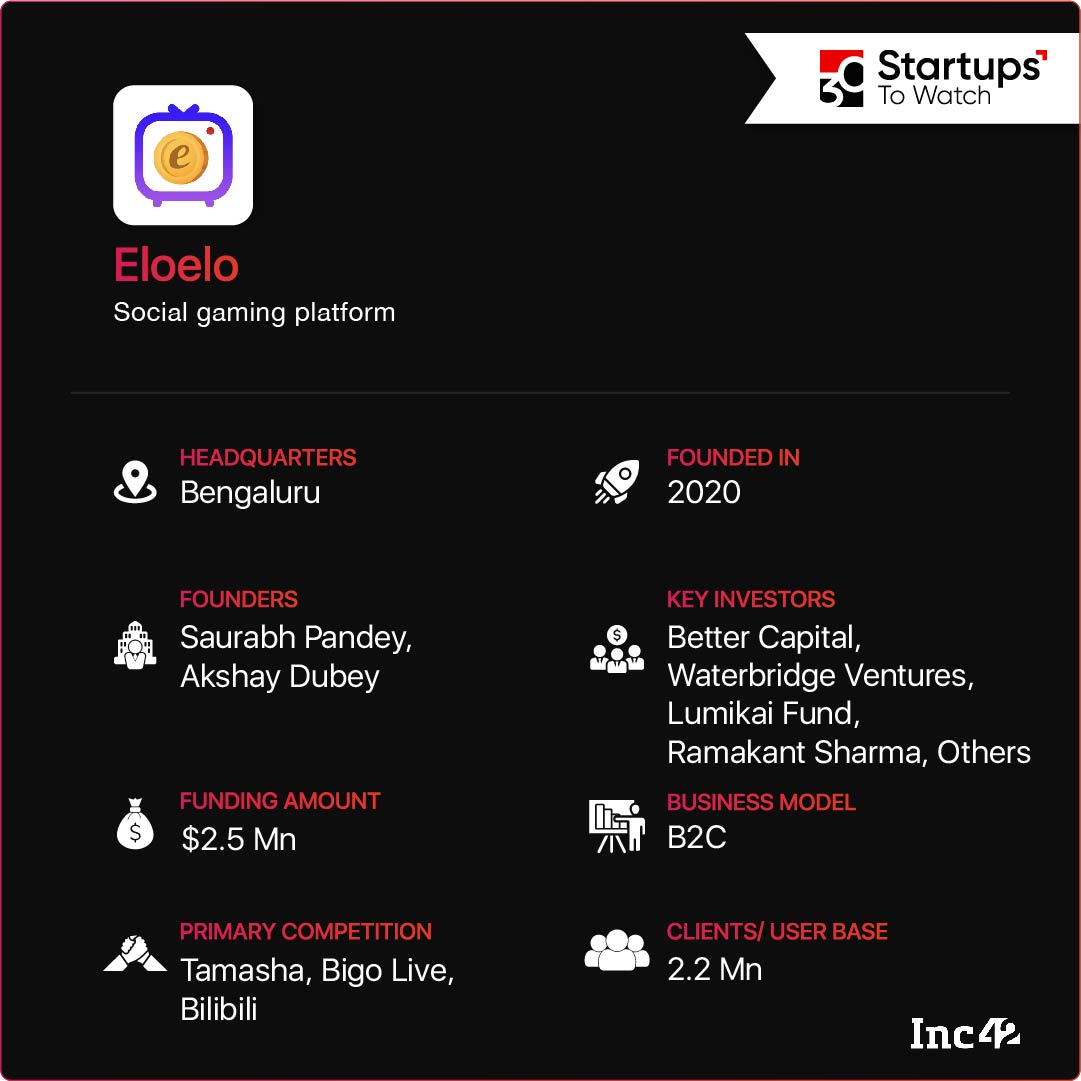
Why Eloelo Made It To The List
The creator economy has been booming for some time, but much of its growth depends on how the content is leveraged and consumed. That is why Bengaluru-based Eloelo started a platform in 2020 to live-stream indigenous social games such as antakshari, tambola and quiz contests to help creators monetise their content with support from their vast fan base.
When the startup was featured in October, it claimed to have a user base of 1.1 Mn who played 50 or more games on its platform. But within two months, it has added three more games and provided an excellent viewer experience. The add-ons have triggered a 10% rise in consumer retention and 5% retention across the creator community. Daily engagement on the app has also gone up from 60 minutes to 75 minutes, and 75% of this growth is organic.
As of now, the content is free for users, while content creators (read: game developers) can monetise their output by selling merchandise through Eloelo’s in-app purchase mechanism. The company has recently launched elo-coins to reward its players, and it can also be used for in-app purchases.
Eloelo is also building a metaverse where users, through their virtual avatars, can take part in KBC-like shows. It wants to add 10 Mn users in 2022 to help generate more than $1 Mn for creators. With three more games to debut in the first half of 2022, the startup is set to launch monetisation-ready ticketed events. It will also expand its operations to the Middle East and North Africa by 2022.
Enthu.AI

Why Enthu.AI Made It To The List
Set up in 2020, Chandigarh-based Enthu.AI is a B2B SaaS platform that automates call monitoring and call quality analysis (QA) for call/contact centres. The conversational intelligence platform helps businesses derive actionable insights, underlines the requirements for improvement and provides an end-to-end agent monitoring, evaluation and coaching system.
When the startup was featured in May, it only operated as a voice call analysis platform. But it has now introduced several new features such as live chat and voice call QA, added Spanish to its language offerings and set up five contact centres, taking its total number of clients to 15.
Enthu.AI was one of the 17 startups featured in a five-week growth programme called SaaS Central, hosted by Prime Venture Partner, AWS and YourStory. The conversational intelligence platform also worked on a product-market fit and ramped up its product and sales teams throughout 2021. It is now planning to reach an ARR of $500K by leveraging these developments.
Evenflow
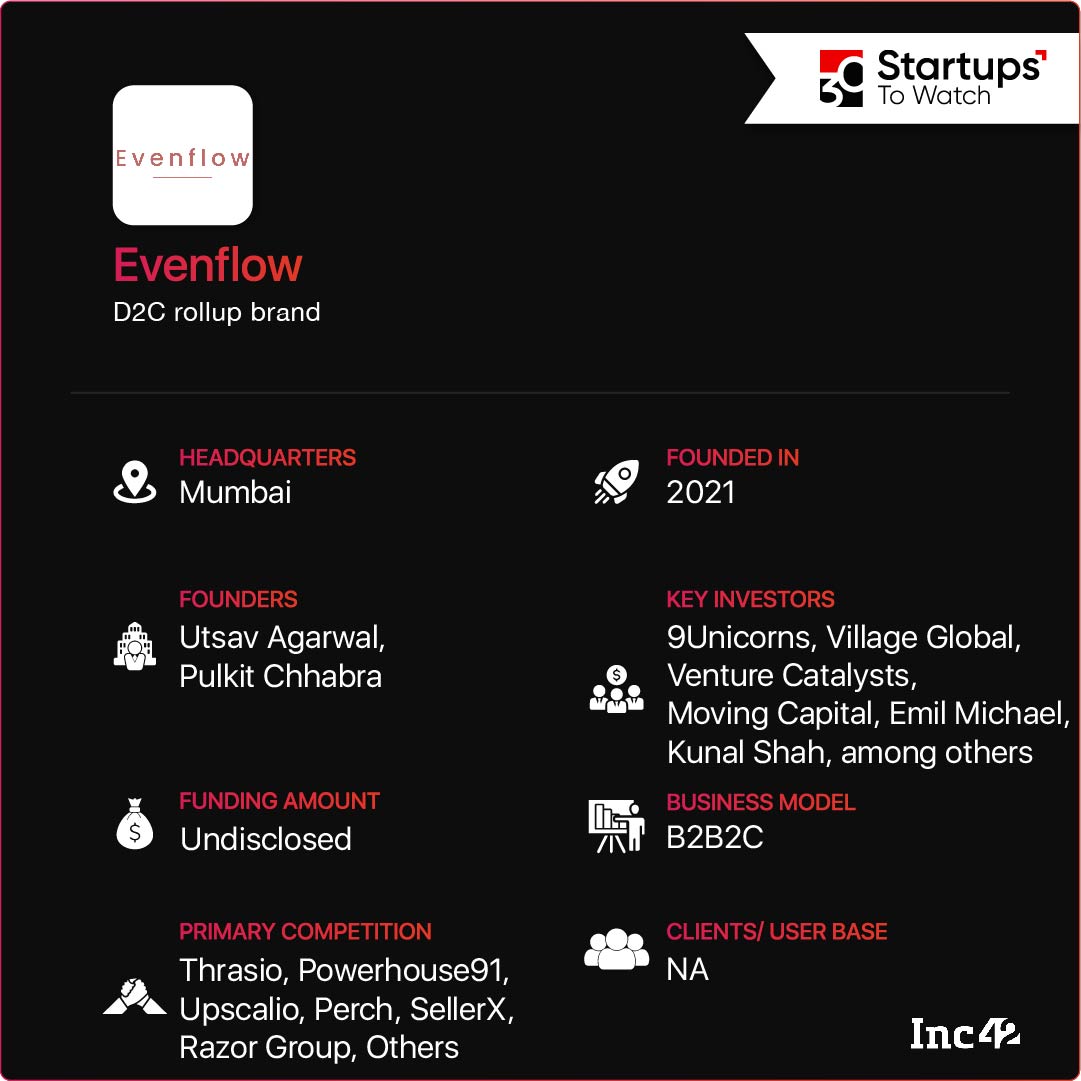
Why Evenflow Made It To The List
With new-age D2C brands witnessing rapid growth across India, quite a few related and disruptive business models such as the enabler ecosystem and ecommerce rollups (the Thrasio model) have recently seen huge traction. Mumbai-based Evenflow is one such Thrasio-style company, set up in 2021. It targets brands that generate more than 80% of their revenues on ecommerce marketplaces and acquires those sellers to scale up their operations and profits. Evenflow and its ilk achieve this turnaround goal by optimising critical processes like operations, supply chain, brand building and performance marketing within their acquired companies.
When the startup was featured in October, it had acquired only two brands — BabyPro and Rusabl. Since then, it has lapped up four companies in sports and fitness and home and kitchen space and plans to close a few more M&A deals by January 2022.
Evenflow claims to have generated 20% MoM growth for its portfolio brands by launching new products and placing them on marketplaces beyond Amazon-Flipkart. These entities are now available on fast-growing platforms like Jio, Meesho, CRED and Shopee. It aims to scale up portfolio brands by 300-500% in 2022 by focussing on global growth, as it is keen to earn at least 25% of the revenue from foreign markets.
The company has raised an undisclosed pre-series A round from Village Global, Venture Catalysts, ex-Prione chief and Reliance Retail CEO Sanjeev Varaganti and others. The money will be used to acquire more brands, build their capacity, expand their geographical presence and grow the in-house team.
GlamPlus
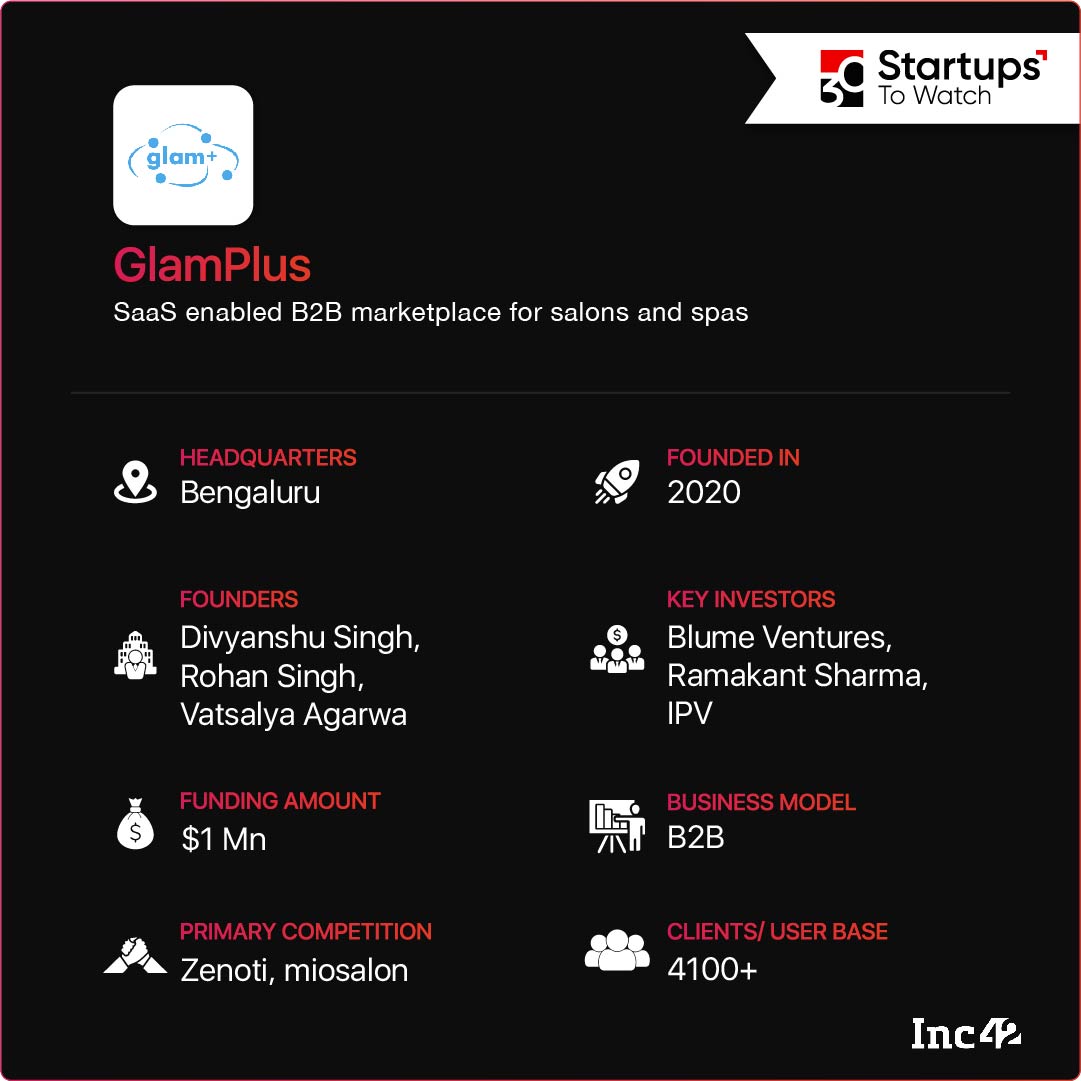
Why GlamPlus Made It To The List
Bengaluru-based GlamPlus was launched in 2020 as a data-driven engagement platform that aimed to empower the SMB-dominated offline economy, especially businesses like salons, spas and gyms. GlamPlus was featured in July when it operated as a B2B2C company, and its bouquet of software solutions included virtual session management, customer management, performance analytics and expense and inventory management.
But it has now pivoted successfully to a B2B marketplace specialising in beauty products. In addition, the company offers a full-fledged ERP programme for staff management and a unified, integrated solution for digital appointment tracking, invoicing, revenue management and customer management to help salons and spas.
With the new features in place, the startup has recorded a 20% MoM growth in user base, while salon retention has increased to 77%. GlamPlus’s B2B business alone has grown 100x in the past six months, from INR 2 Lakh to INR 2 Cr. Plus, it raised $600K at a valuation of $6 Mn from Blume Ventures, LivSpace’s Ramakant Sharma and others to achieve a top-line of $12 Mn ARR in FY22. Interestingly, it has added a green streak to the B2B business and opted for biodegradable packaging.
In 2022, GlamPlus plans to dive deep into the offline-first SMB segment, bringing traditional businesses online and enhancing their tech adoption. It will expand its B2B business in Tier 1 cities and also go global, starting with Southeast Asia and the APAC region.
Grip Invest
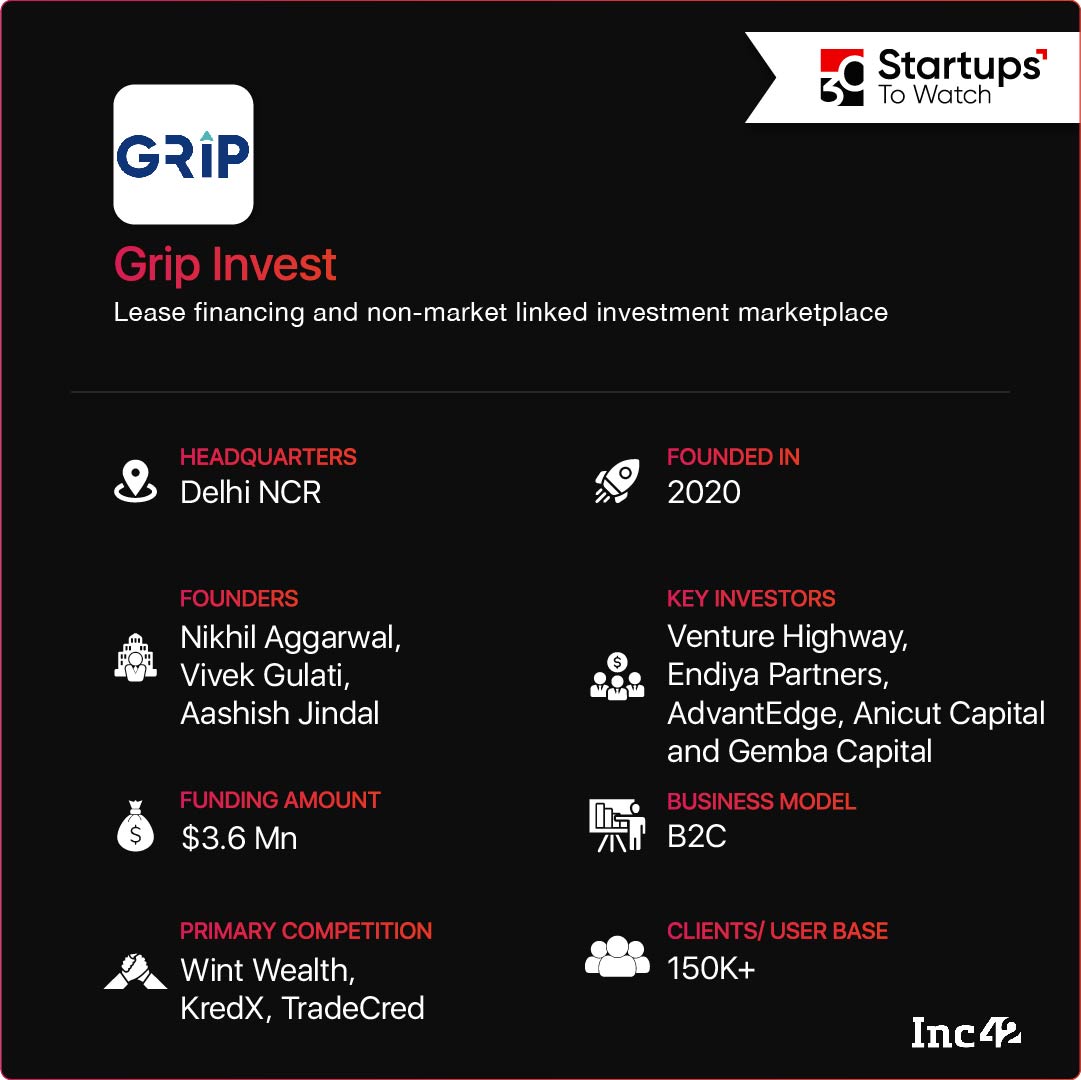
Why Grip Invest Made It To The List
Set up in 2020, Gurugram-based Grip Invest is a lease finance platform where investors can purchase and lease assets to companies. Simply put, the platform provides an additional investment instrument while companies can grow faster by converting traditional capital expenditure to operational expenditure. Grip’s key clients include BigSpoon, Battery Smart, Udaan, Furlenco, FabAlley and LetsTransport, among others.
When Grip Invest was featured in March, it had already helped retail and corporate investors purchase and lease assets worth INR 22 Cr. In the nine months that followed, the fintech startup has facilitated total investments of more than INR 150 Cr.
Grip has expanded its offerings beyond lease, launching inventory financing and angel investing, attracting 100K+ investors and operating in 322 cities across 42 countries. Started in October 2021, these new products have already attracted investments worth INR 20 Cr.
The startup raised $3 Mn in a Series A round as it plans to introduce another investment product within the fixed-income financing and corporate asset-backing segments by FY22. It aims to reach an AUM of INR 1,000 Cr by 2022 through investments in electric vehicles (two-wheelers, three-wheelers and heavy-duty trucks), charging stations and businesses dealing in swappable batteries.
IppoPay
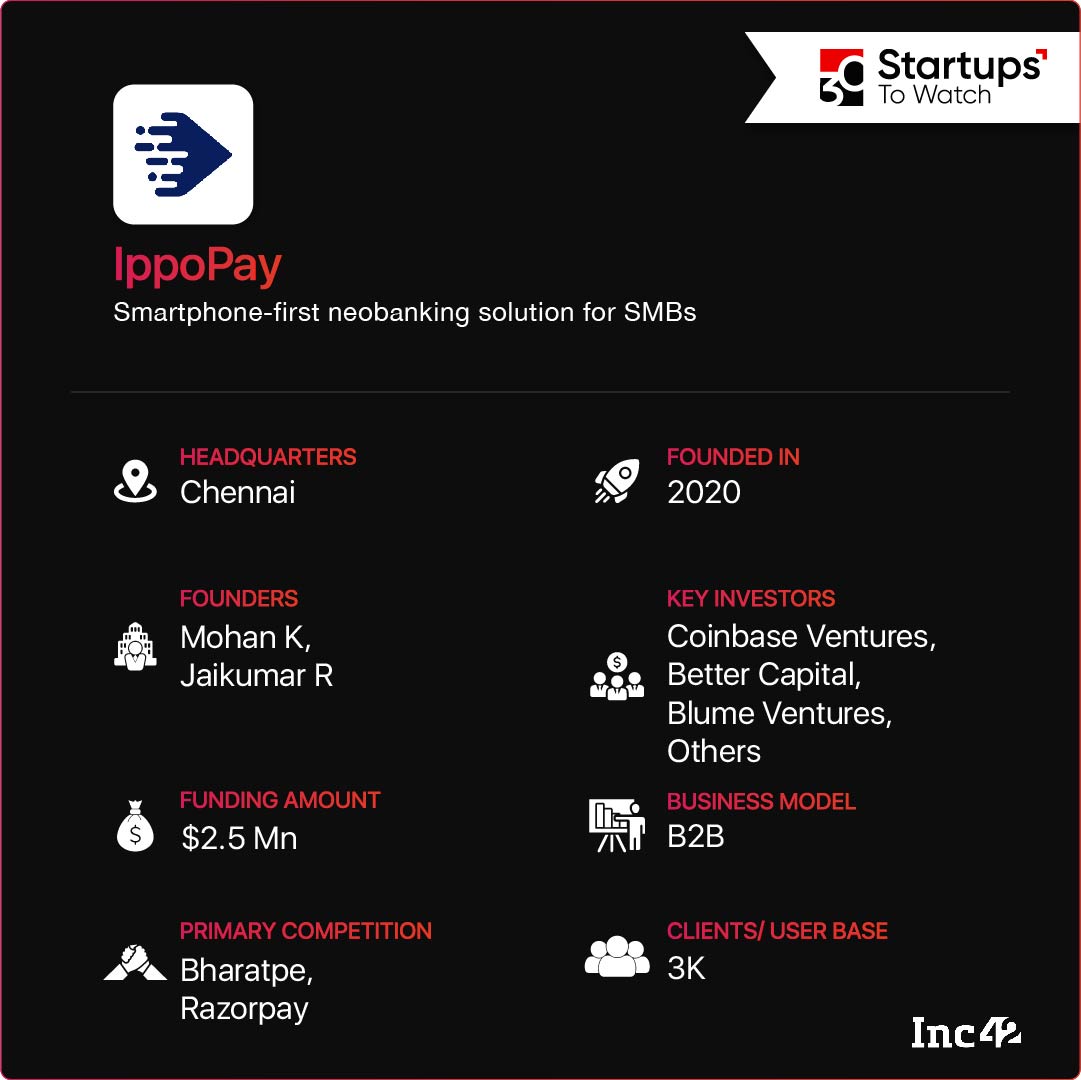
Why IppoPay Made It To The List
Major payment gateways are primarily designed for large enterprises. But Chennai-based IppoPay was started in 2020 to cater to the underserved — freelancers, homepreneurs and MSMEs. The full-stack, API-based financial services platform allows businesses to meet the banking needs of any merchant, be it fund transfer, pay-ins and pay-outs, borrowing, buying insurance and more.
When we featured the startup in September, it had just piloted its neo-banking services and was about to be launched in rural Tamil Nadu. But in the past three months, it has onboarded more than 1,000 merchants and processed more than INR 4,000 Cr worth of transactions. The company has also turned EBITDA positive, with a current revenue rate of $5 Mn for FY22.
In September, the fintech firm raised a seed round of $2.5 Mn from Coinbase Ventures and Blume Ventures (both joined the company’s board) for merchant acquisition and technology enhancement. It plans to launch two new services in 2022, including BNPL (buy now pay later) and tap to phone where a smartphone works as a PoS and accepts contactless, card-enabled payments.
Kazam EV
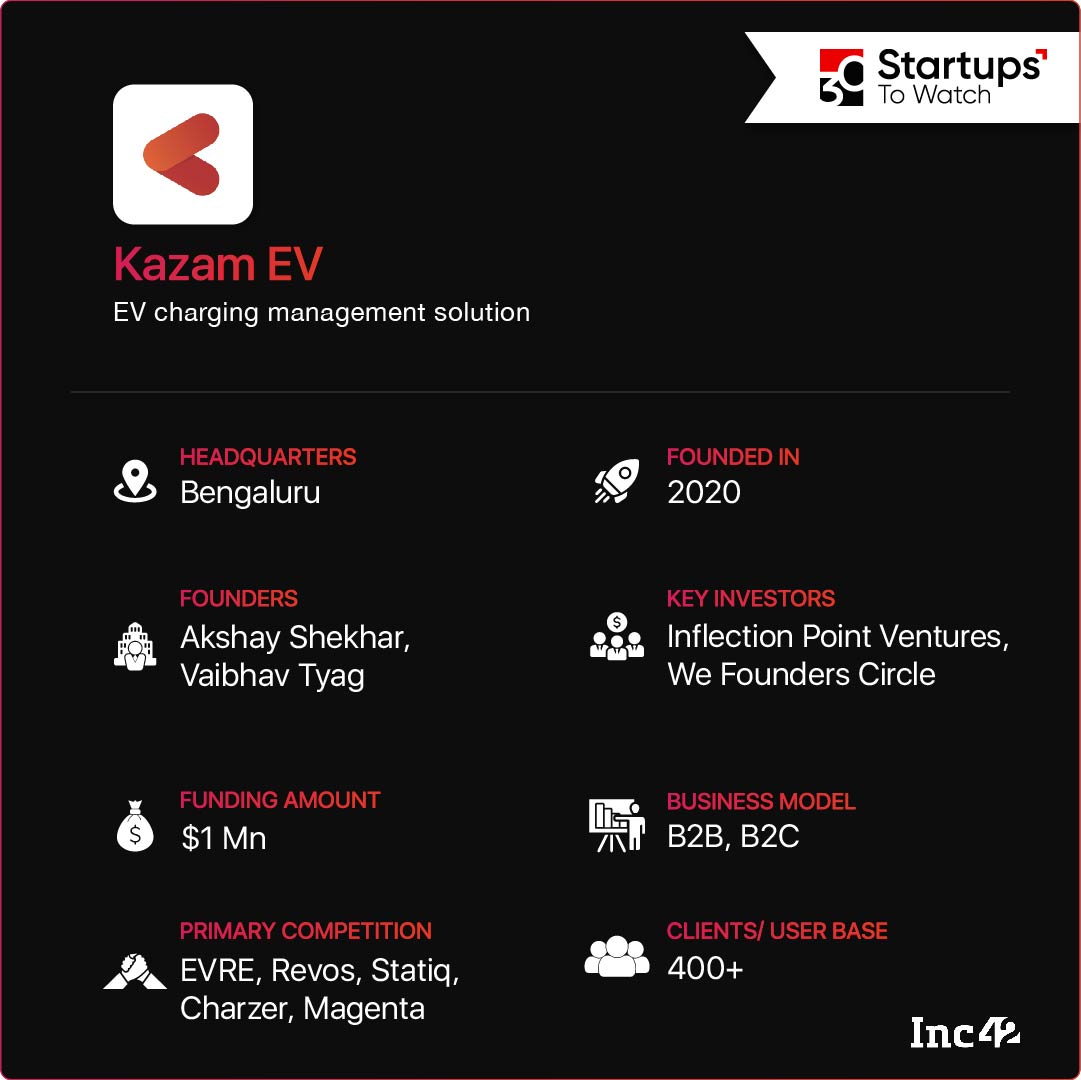
Why Kazam EV Made It To The List
Bengaluru-based Kazam EV joined the EV enabler space in 2020, providing IoT-driven charging hardware along with charge management software (CMS). The affordable setup has helped many kirana stores and mom-and-pop shops double up as local charging stations, easily found by EV drivers.
Featured in Inc42’s July edition, Kazam aimed to become a super app for all EV needs. Subsequently, it added new features to its CMS to include, manage and analyse the performance of multiple charging points (both Kazam and non-Kazam units) besides monitoring energy consumption. EV manufacturers can also integrate the software with their vehicles as a value-added offering. The company also launched load management software for housing societies or areas with fixed loads to ensure optimal power flow from the main grid without operational glitches, ensuring a smooth functioning electricity flow to its charging points.
The company won the Uber Green Mobility Innovation challenge and recently bagged a tender from the Delhi government to set up 30K charging stations in the national capital. It has also partnered with BSES Yamuna, BSES Rajdhani, Tata Power and other OEMs and fleet operators for similar operations. The company claims to have installed 2,500+ EV charging stations and plans to take that number to 10K+ by 2022. It has a DC fast charger in the production pipeline and is currently working on 7.4 kW AC charging stations (home chargers).
Kissan Pro
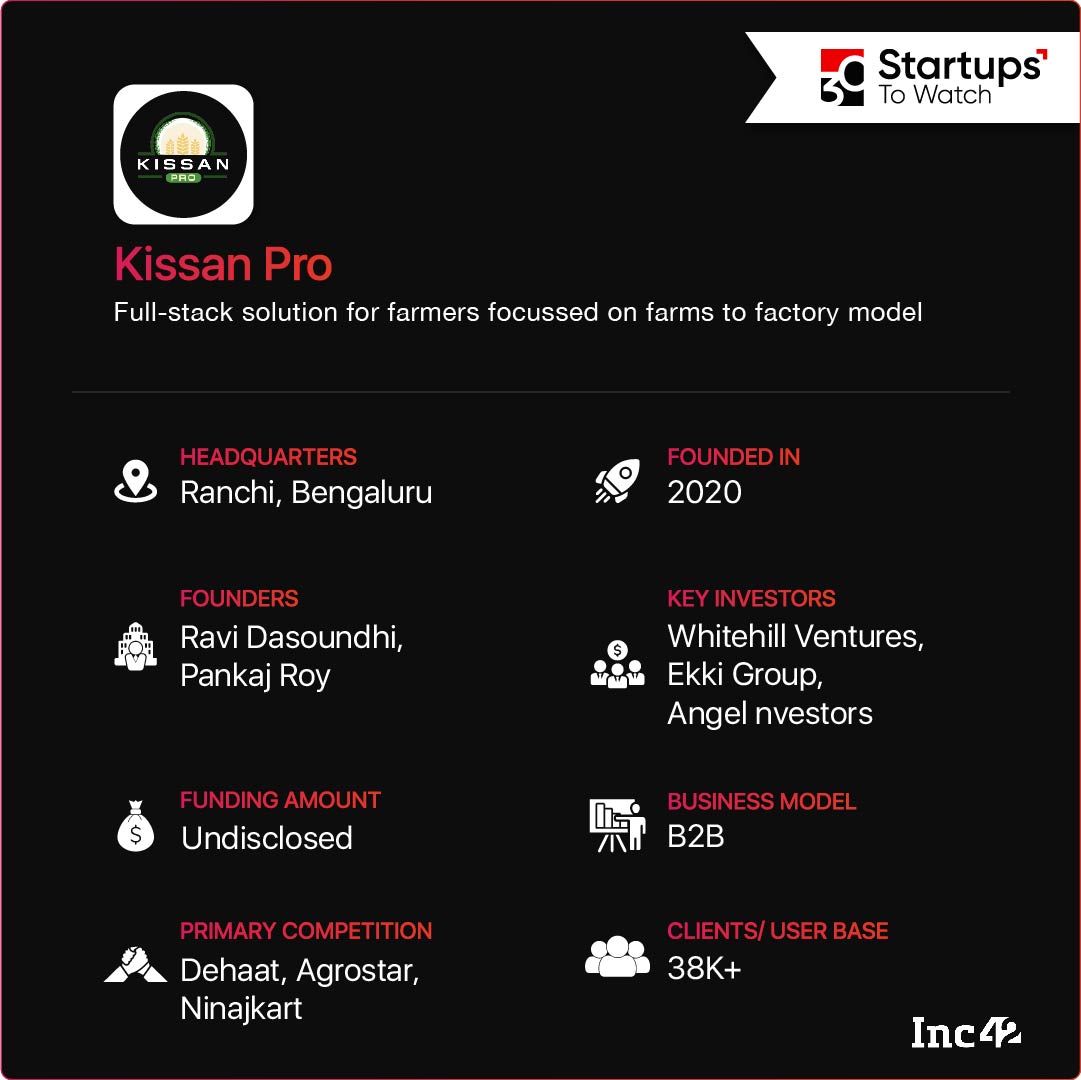
Why Kissan Pro Made It To The List
Most farmers in India struggle to eke out a living due to inadequate capital and tech support, high input costs and a broken supply chain, often leading to huge losses. Launched in 2020, Bengaluru-based Kissan Pro was aware of these pitfalls and wanted to address key problem areas such as supply chain, finance and crop insurance and best agri-practices required to maximise farmers’ incomes and benefit all stakeholders in the process. When the startup was featured here in October, it managed more than 40,000 acres of land in Jharkhand and catered to a network of 22K+ farmers.
It has now entered Bihar and Karnataka and plans to expand to Maharashtra by 2022. Better still, its recently launched farm-to-consumer traceability option helps ensure product quality and gets a better price due to crop provenance. The company has set up a full-stack data science and tech-enabled farm excellence centre where its agronomy team will study the key crops exported to specific markets. It will then share the results with its farmers’ network to help them grow better crops.
Kissan Pro’s farmer base has grown by 75% between October and December, and its transaction revenue has increased by 120%, thus reaching a break-even. It plans to raise an institutional round of funding in the first quarter of 2022 to expand into two more states besides improving tech and supply chain, onboarding 150K+ farmers and establishing an export network with at least six countries.
MoEVing
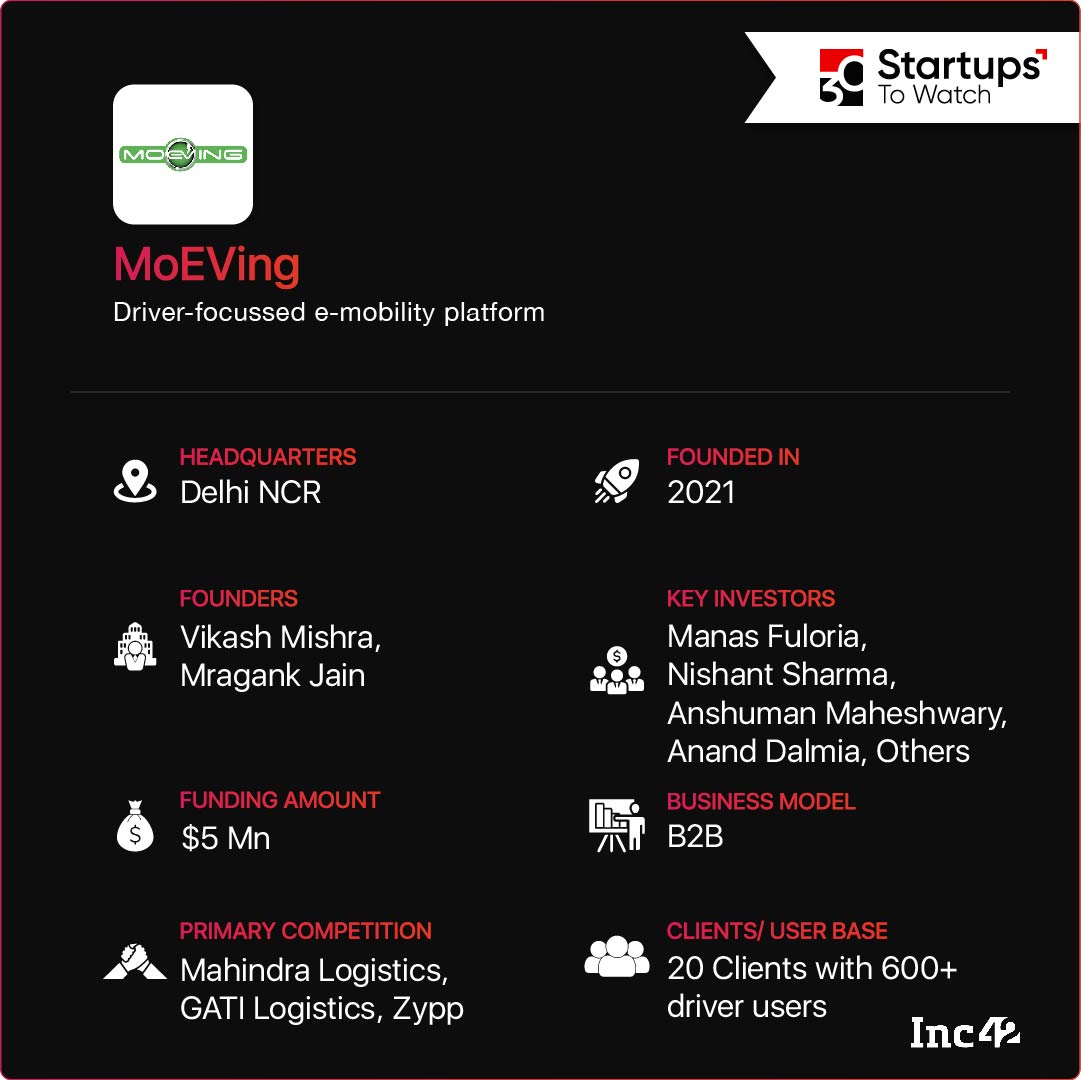
Why MoEVing Made It To The List
EV is the latest rage right, especially among the well-heeled, but Delhi-NCR-based MoEVing was launched in January 2021 to serve an entirely different segment. It aimed to electrify the delivery fleets of new-age, hyperlocal companies to bring down costs and enhance the green impact. The industry response was encouraging. In about three months, it had deployed 100+ two-wheelers and three-wheelers (complete with dedicated drivers) to five clients in Delhi-NCR, Bengaluru and Pune, MoEVing told Inc42 when we featured it in April.
By December end, its EV fleet grew to 600+, spread across 10 cities, and it operated as many as 12 charging hubs in those locations. The company raised $5 Mn in a seed round to scale its technology platform, operations and charging infrastructure. It plans to acquire 10,000 EVs and operate 100 charging hubs in 30 cities by FY23.
Interestingly, MoEVing has in place a B2C model as the company allows individuals to join as EV drivers for its B2B fleet. In November, it tied up with several FIs to help drivers with EV financing in two cities and now plans to expand this scheme pan-India. Then there are partnerships with 20 EV makers such as Euler, Altigreen and Piaggio for bulk buying to service B2B customers. The startup has recently ordered 1,500+ road-ready EVs from Altigreen and 1,000 units of Euler’s three-wheeler electric van called HiLoad.
Morning Owl
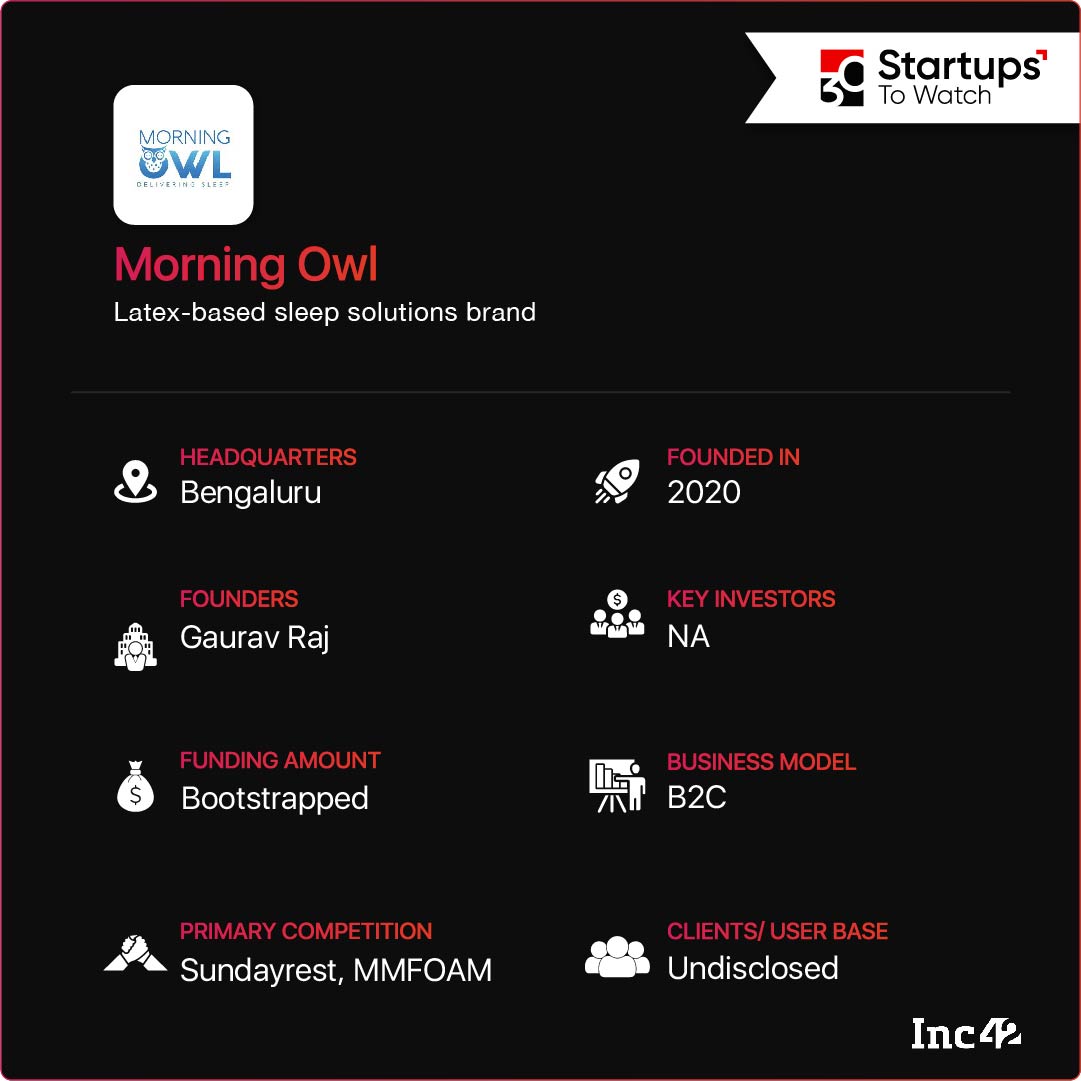
Why Morning Owl Made It To The List
Morning Owl was launched in 2020 to make healthy sleep accessible and affordable. When the Bengaluru startup was featured in June, it claimed to clock 75% of its sales from its website and the rest from other ecommerce marketplaces like Amazon and Flipkart.
Since then, Morning Owl has opened its first offline experience centre in Bengaluru, thus gaining an omnichannel edge. It has also expanded its product categories from latex mattresses to toppers and pillows.
The company claims an ARR of INR 12 Cr in FY22, which will be tripled in the next financial year. During January-March 2022, it will launch special mattresses designed for babies, toddlers and pets in addition to eco-friendly home furnishings. The bootstrapped startup will also raise funding to drive growth through physical experience centres set up across its highest-sales geographies.
muvin
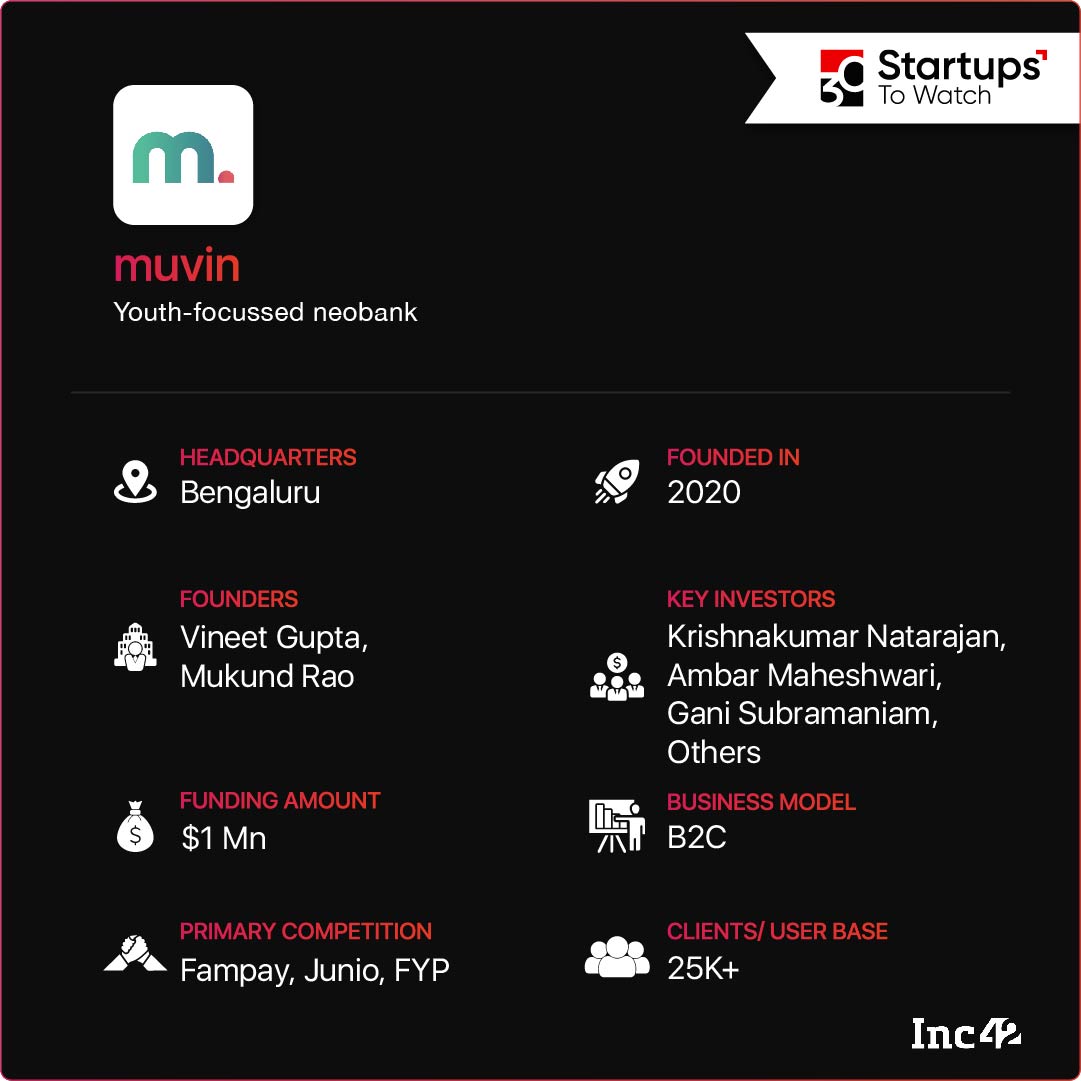
Why muvin Made It To The List
In a country like India, where only 27% of people are financially literate (as per a recent SEBI study), one should learn the art of money management as early as possible. In fact, it is always best to start when one is a teenager, believes muvin, a Bengaluru-based startup that aims to train young people how to handle money through an intuitive, gamified experience. The company was started in 2020, and when we reached out in March, it was still developing its services, tech infrastructure and a core team.
It launched the muvin app in September, and a month later, piloted a tap-and-go prepaid card called muvinCard to help kids make sound financial decisions and transact like well-informed adults. In November, the company started another financial literacy section with Monika Halan, a journalist and author of Let’s Talk Money. Meanwhile, it had onboarded cricketer Hardik Pandya as its brand ambassador and made a digital movie on the value it brings to its young users.
The startup plans to grow its user base from the current 25K+ to 100K+ in Q1 2022 and will raise funding in January to reach that goal. It will also launch new features such as rewards, offers and bite-size gamified content (animated videos) to be deployed through seminars, quizzes and campus events.
Pazcare
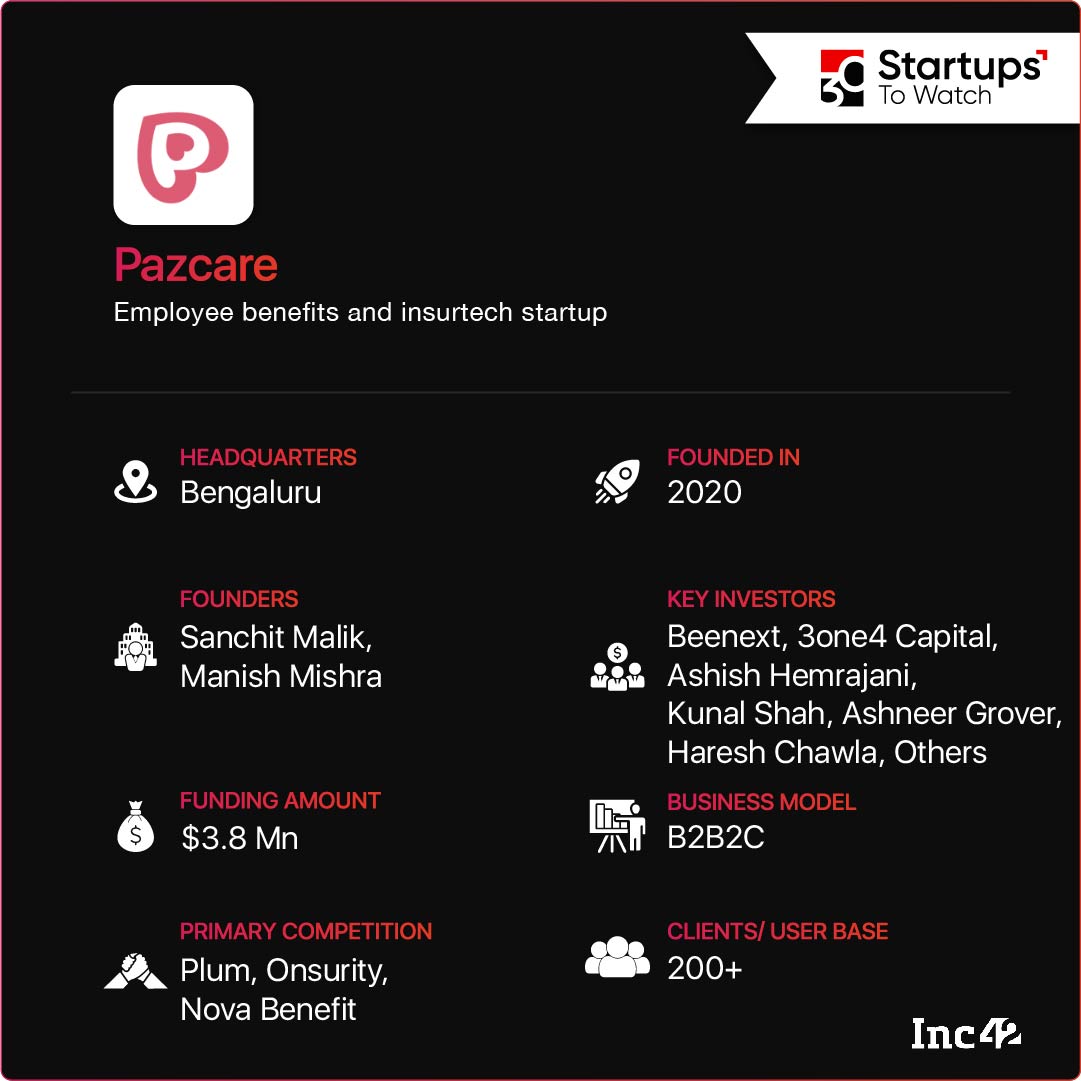
Why Pazcare Made It To The List
Since Bengaluru-based insurtech startup Pazcare was featured in July, it has added a couple of new services to its portfolio, including group personal accident insurance and group term life insurance. More interestingly, it now provides a full suite of healthcare and wellness benefits such as online doctor consultations, health checkups, yoga and fitness lessons.
Within 18 months of its launch, the company tripled its customer base from 70+ to 200+ corporate clients and added the likes of Vedantu, Mindtickle, Chaayos, WazirX and Toppr to the mix. It was recently granted an insurance broking licence by the regulatory body IRDAI and raised $3.5 Mn in a seed round from BEENEXT, 3One4 Capital and other angel investors.
The startup plans to add more than 2K customers in 2022, enter new categories to cover insurance, health and financial benefits, and launch its operations overseas.
Portl
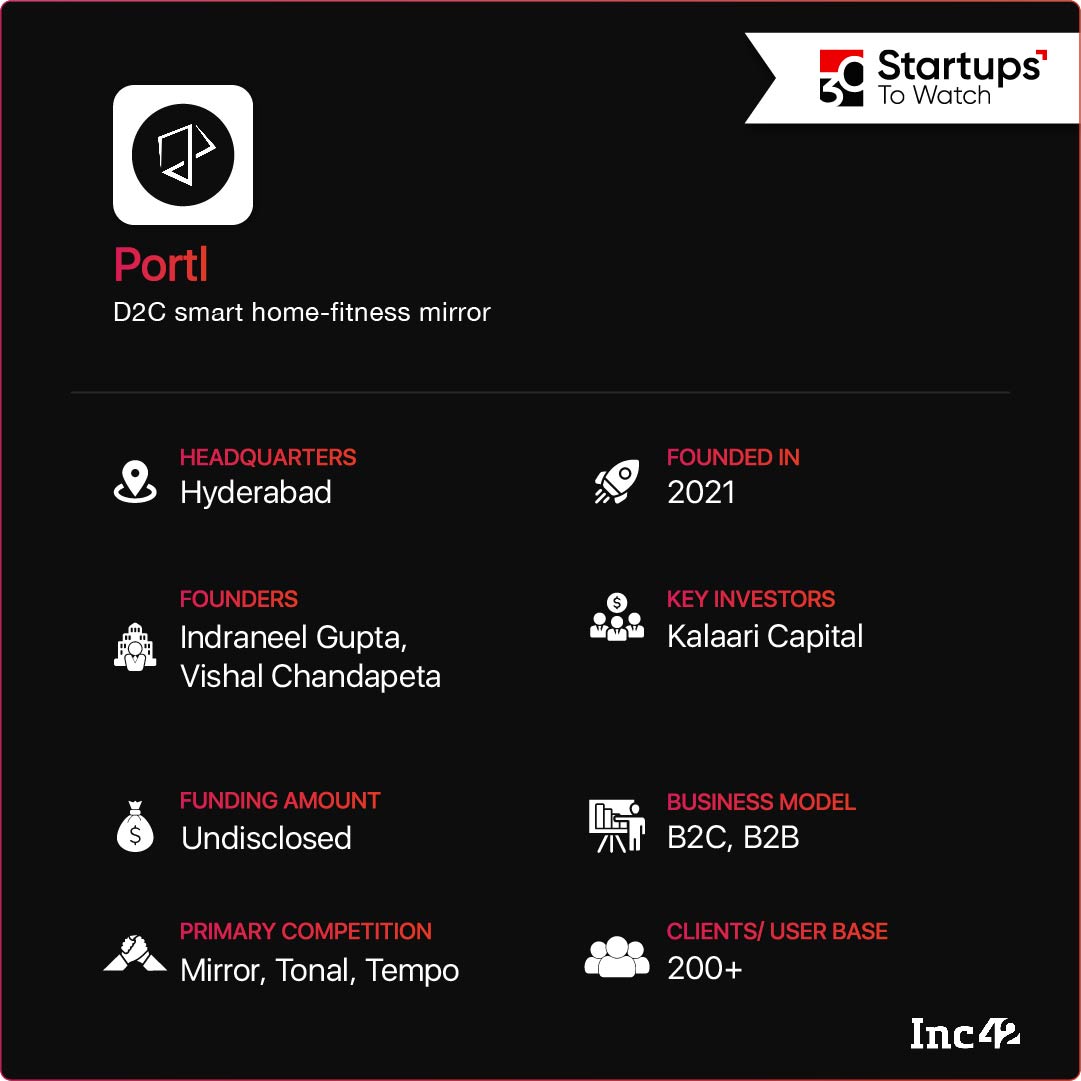
Why Portl Made It To The List
When Hyderabad-based Portl was featured in July, its smart-tech-enabled fitness mirror was compared to a gadget straight out of a sci-fi movie. But its flagship product, called the Portl Studio, was in the pre-booking phase at the time. For those yet to come across it, let us tell you a thing or two. The ‘mirror’/hardware uses AI power to monitor health and fitness at home. The healthtech firm’s personalised wellness solutions also cover nutrition coaching and mental well-being, and users get real-time feedback on all crucial parameters.
In November 2021, Portl launched its first experience store for Portl Studio in Hyderabad and earned more than INR 1 Cr in revenue within three weeks. It also integrated its proprietary exercise and movement pattern assessment software (used for postural assessments) with the device to ensure a detailed and holistic analysis.
The company plans to open 18 experience centres in Mumbai, Delhi-NCR, Bengaluru and other locations in 2022 while targeting INR 100 Cr in revenue. The number of trainers on the Portl platform will also increase to 50, and they will ensure a personalised experience during workouts, nutrition fixes and mental well-being sessions.
QuickShift
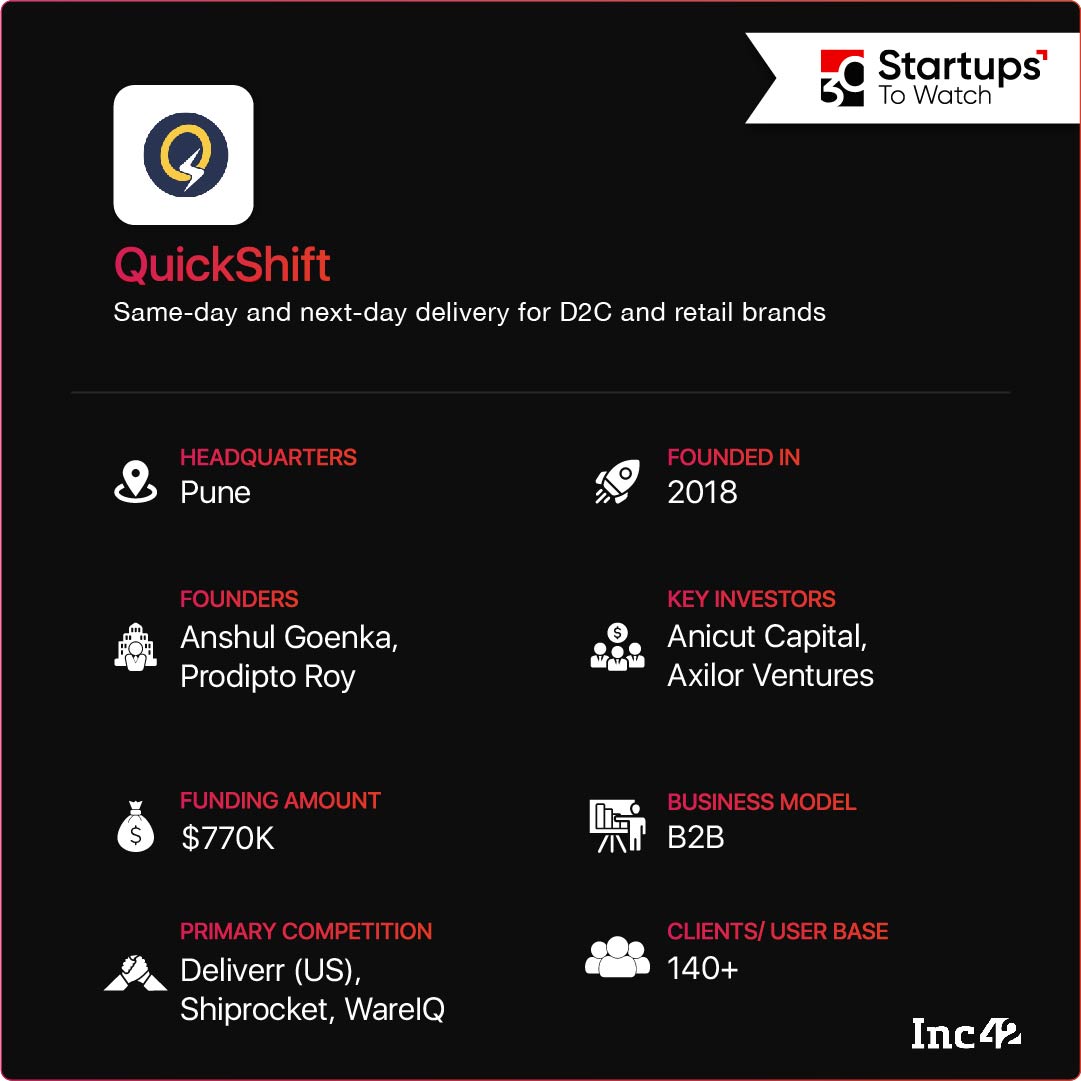
Why QuickShift Made It To The List
The logistics industry never had it so good, thanks to the latest surge in ecommerce, quick commerce and instant delivery. So, it is not surprising that QuickShift and its ilk are growing in leaps and bounds. Set up in 2018, the Pune-based firm offers tech-enabled, multi-city warehousing and integrated shipping. In fact, it specialised in fast shipping — delivery in 24-48 hours — when Inc42 featured the company in August. Other services included transparent order management, CoD option, non-delivery receipts and return-to-origin reports.
In the past four months, the startup has added QuickShift Rapid (QS-Rapid) and Rapid+ to its service portfolio, offering same-day and two-three hour delivery solutions, respectively, to B2C companies. It has also developed a front-end interface that aggregates last-mile courier partners so that businesses with pan-India requirements can quickly access the best resources.
It has recently set up a 60,000 sq. ft fulfilment centre in Mumbai and expanded the Kolkata unit to deep dive into eastern and north-eastern markets. Its order processing capacity has also increased from 4K to 15K per day. The company plans to develop Mumbai-like fulfilment centres in Bengaluru and Delhi-NCR in 2022 and extend its last-mile solutions beyond Mumbai and Delhi.
SalaryBox
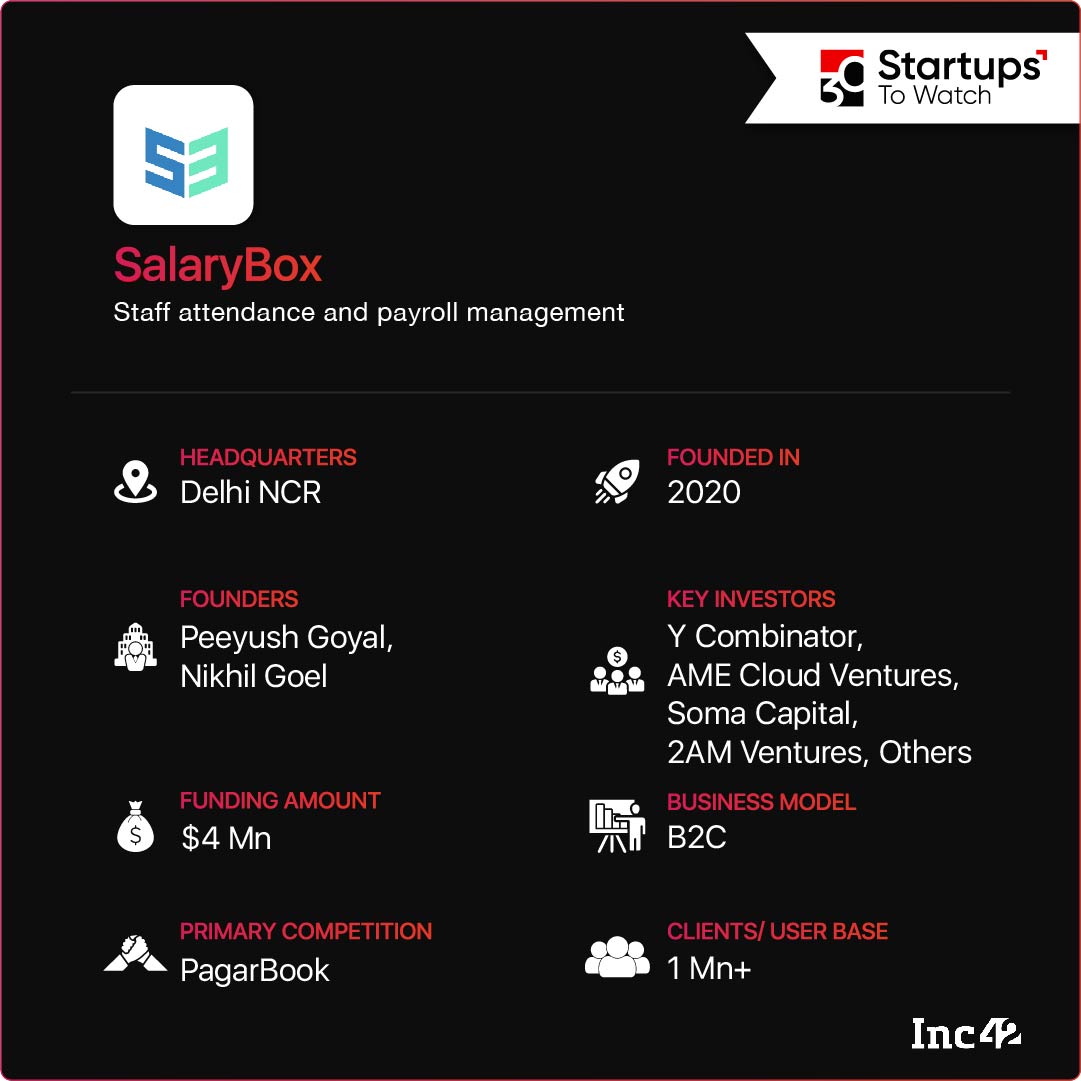
Why SalaryBox Made It To The List
Launched in May 2020, SalaryBox from Delhi-NCR offers an app-based employee management solution, helping small businesses handle blue-collar workers’ attendance and payroll in the most efficient manner. When it was featured in October, the startup did not charge for its service, but more than 1 Mn employees had already benefited from process streamlining.
Since then, it has come out with three new features. It has a premium plan with QR attendance, selfie attendance and a roster management tool, all single-click procedures to enhance the app experience. Besides, a digital payment solution enables business owners to pay their employees via the SalaryBox app.
The startup currently serves 100K+ small businesses, leading to significant revenue growth and a rise in B2B clients. In November, it raised $4 Mn in seed funding and aims to grow its user base to more than 10 Mn employees by 2022.
Global expansion is on the cards, especially across Southeast Asia. The company will also build solutions across the employee lifecycle, accelerate integration to improve efficiency and double down on customer support. Its main agenda is to bring all blue-collar and grey-collar employees under financial inclusion by providing them access to crucial payroll data and employment details.
SaveIN
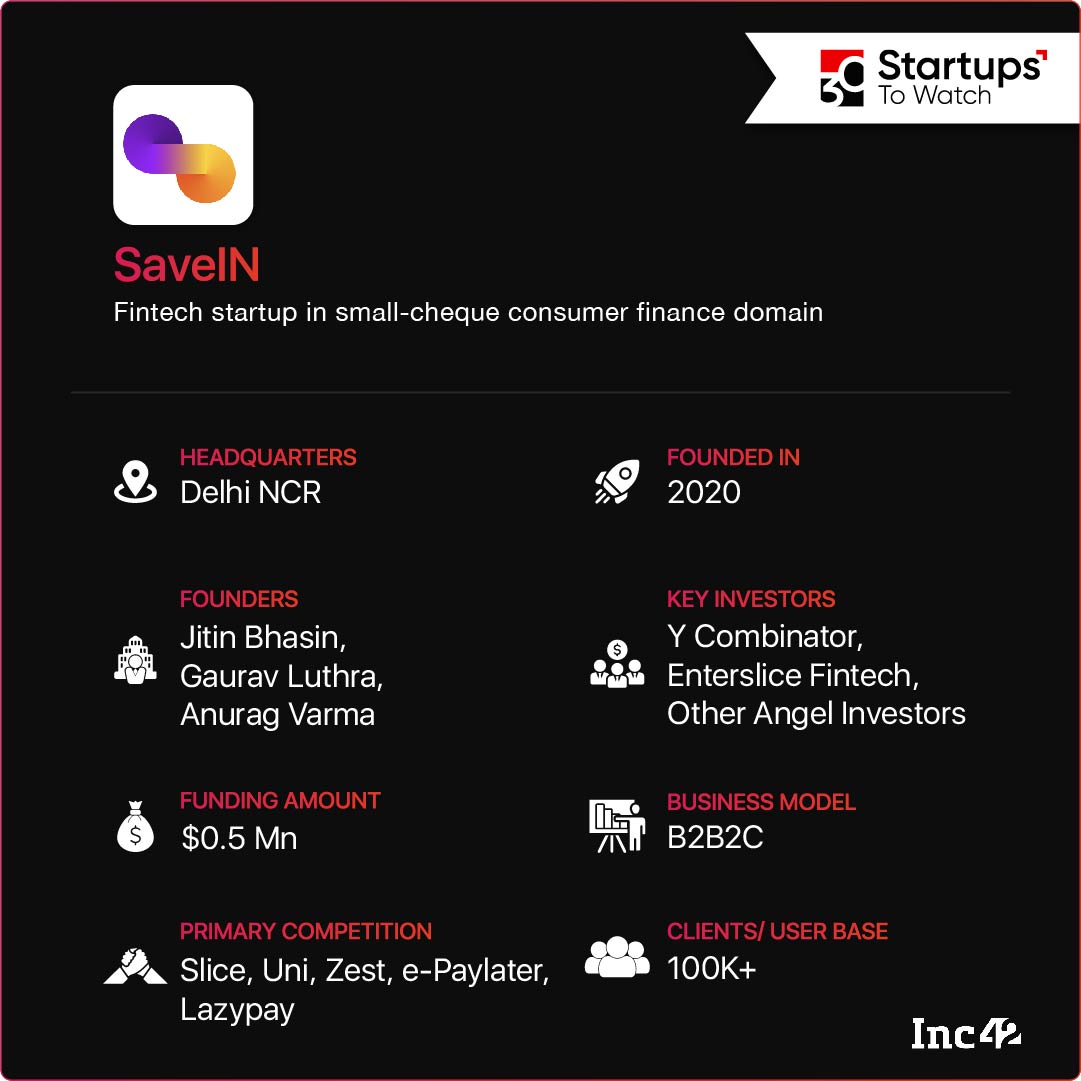
Why SaveIN Made It To The List
Delhi NCR-based SaveIN was set up in 2020 as a social finance-led neobanking platform. It had started building a loan product, but the company was still in beta when it was listed here in July.
In December, it launched a first-of-its-kind, an offline BNPL product dealing in healthcare finance. Called ‘Care Now, Pay Later’, the product had a pilot in 100+ locations in Delhi-NCR and covered several healthcare practices such as dental, eye and hearing care, dermatology, physiotherapy and reproductive health.
SaveIN consolidated its product suite and partner base and joined the Winter 22 batch of Y Combinator to further its one-off product. And in September, it raised $500K in an extended pre-seed A round to grow its in-house team.
CNPL has more than 100K registered users who have either benefited or will benefit from its flexible payment plans. It will be launched in 15+ cities in 2022, and the company aims to onboard more than 1K healthcare providers to strengthen its services and reach.
The Sleep Company
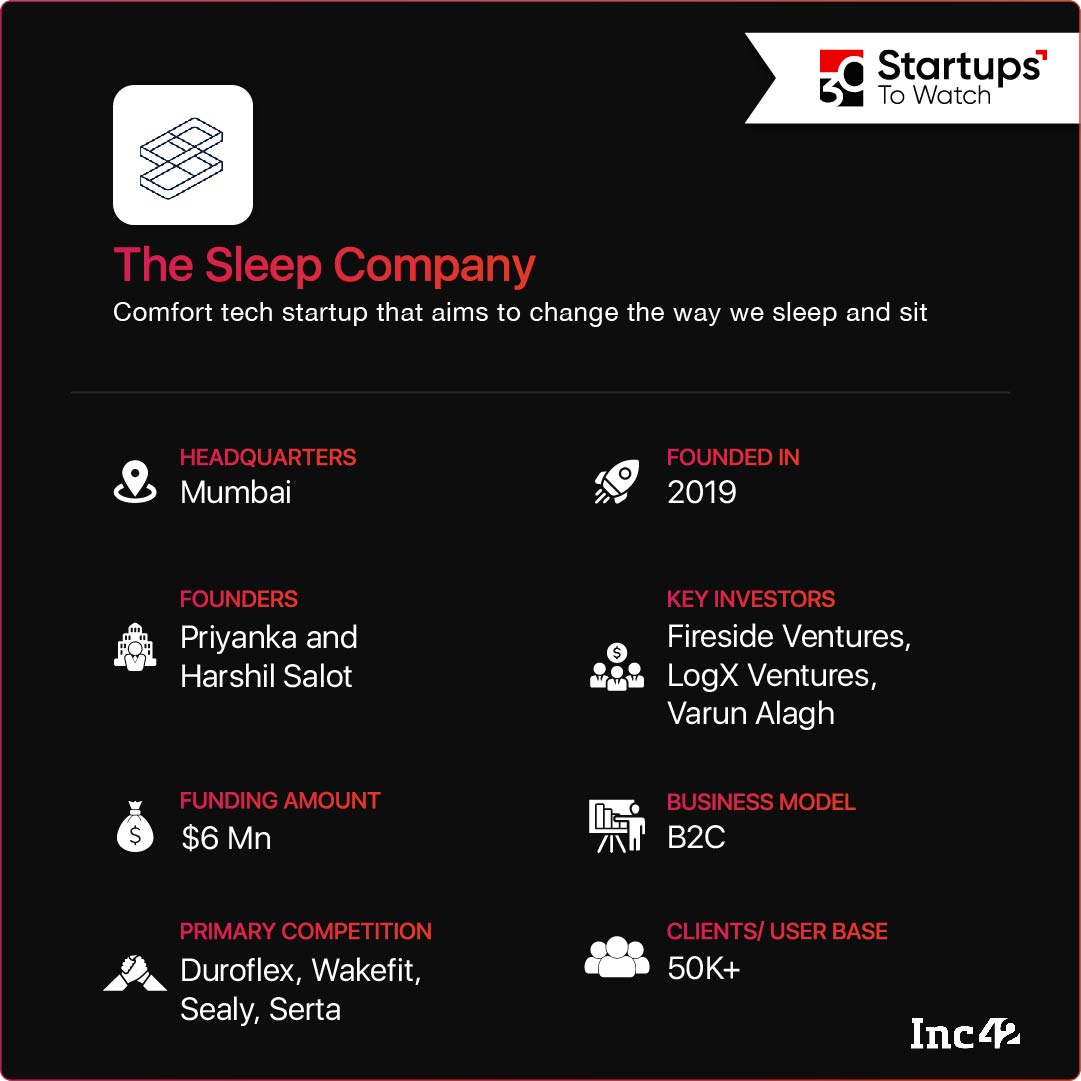
Why The Sleep Company Made It To The List
Set up in 2019, The Sleep Company from Mumbai offers a whole range of products to ensure a good night’s sleep. But when the D2C company was featured in July, it had only two product lines, the SmartGRID Ortho and the SmartGRID Luxe mattresses. Although the company claimed that its hyper-elastic polymer mattresses would provide a superior sleep experience, it also looked at more products for better value addition.
In the past six months, it has added 10 more products to its portfolio under the sleep comfort range, including spring mattresses, premium smart beds and sleep accessories such as regular and cervical pillows, bamboo sheets, mattress protectors and knitted blankets, besides comfortable seating solutions like seat cushions and back cushions. These new products have triggered 400% growth, and the company has reached an ARR of INR 100 Cr.
The startup recently onboarded Anil Kapoor as its brand ambassador and raised INR 13.5 Cr in pre-series A funding. The money will be used to enter the UAE and Japan markets in 2022 and expand its product portfolio to include furnishings and seating solutions like vehicle seats and gaming chairs.
Wherehouse.io
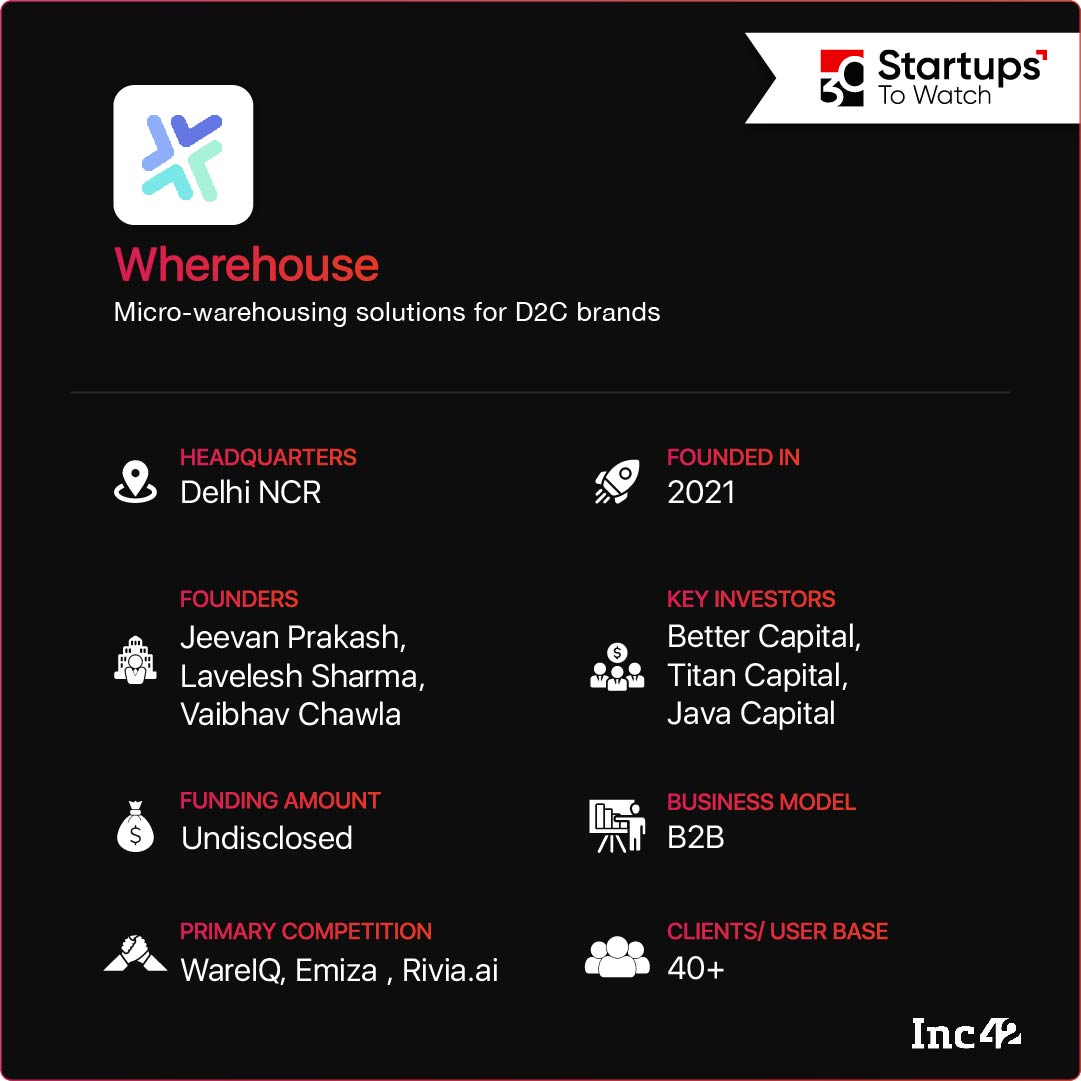
Why Wherehouse.io Made It To The List
India is a fast-growing hub of SMBs that adopt and deploy smart technologies to ensure an operational edge. The country is home to more than 50K digital-first brands and 15 Mn+ active online sellers, further underlining this trend. But most of these businesses face one major operational challenge — the absence of a reliable third-party logistics system. It was also the critical trigger behind Warehouse.io. The Delhi firm was set up in 2020 to offer a network of micro-warehouses within certain cities so that its D2C customers can utilise the service for faster product delivery.
When the logistics startup was featured in June, it had a network of more than 2.5K warehouses in 12+ cities. But in the next six months, it entered several Tier 2 cities such as Lucknow, Bhubaneswar and Ranchi for intercity delivery. In December, the company launched a 12-hour fulfilment programme in Delhi-NCR, signing up 25 brands in the pilot phase. With more than 40 brands in its kitty (for intercity and last-mile deliveries), Wherehouse.io currently operates in 17+ cities and claims to clock 40% MoM growth.
It plans to launch its 12-hour fulfilment programme in 20 Indian cities by 2022.
[Edited By Sanghamitra Mandal]




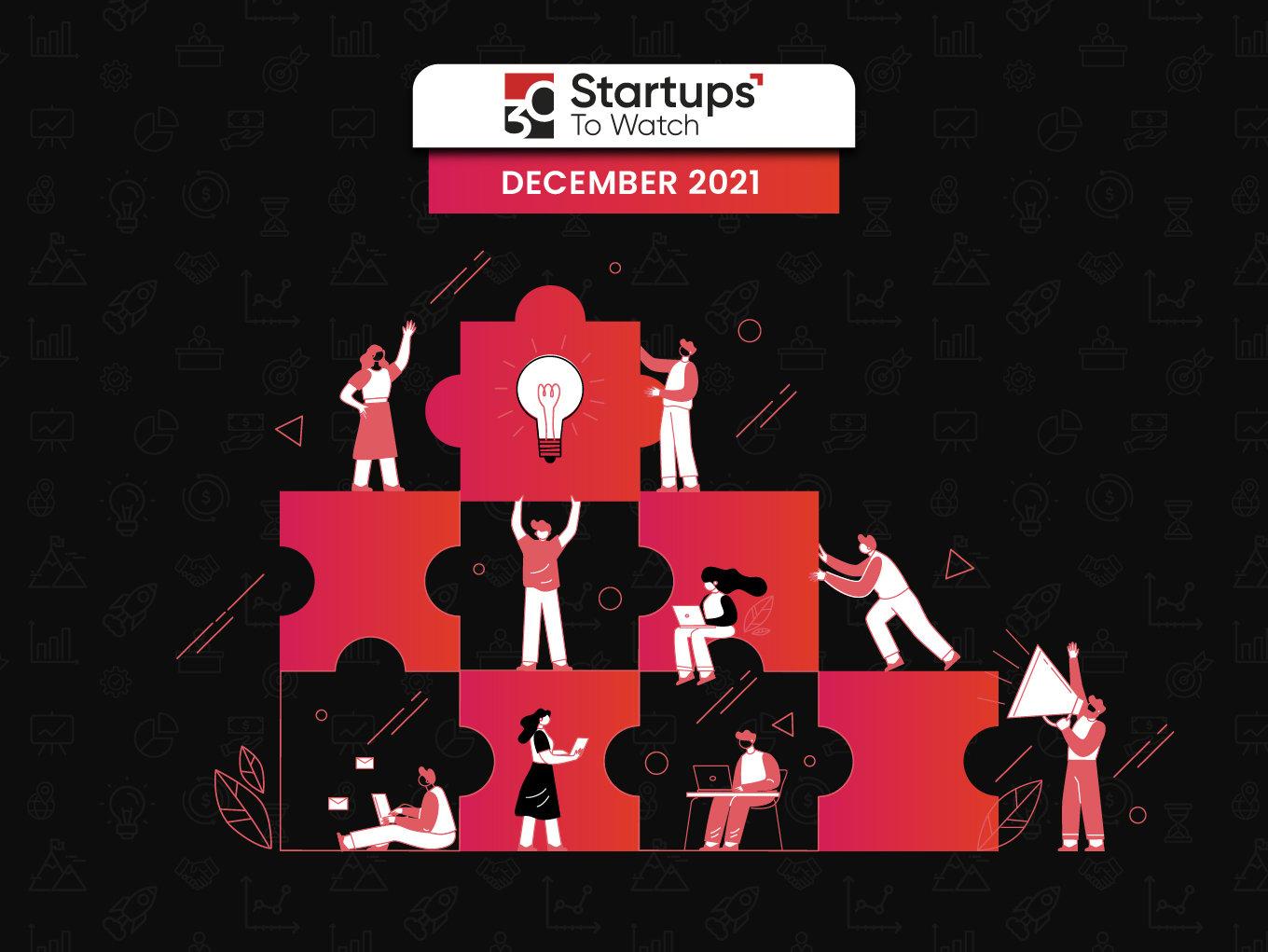



























 Ad-lite browsing experience
Ad-lite browsing experience